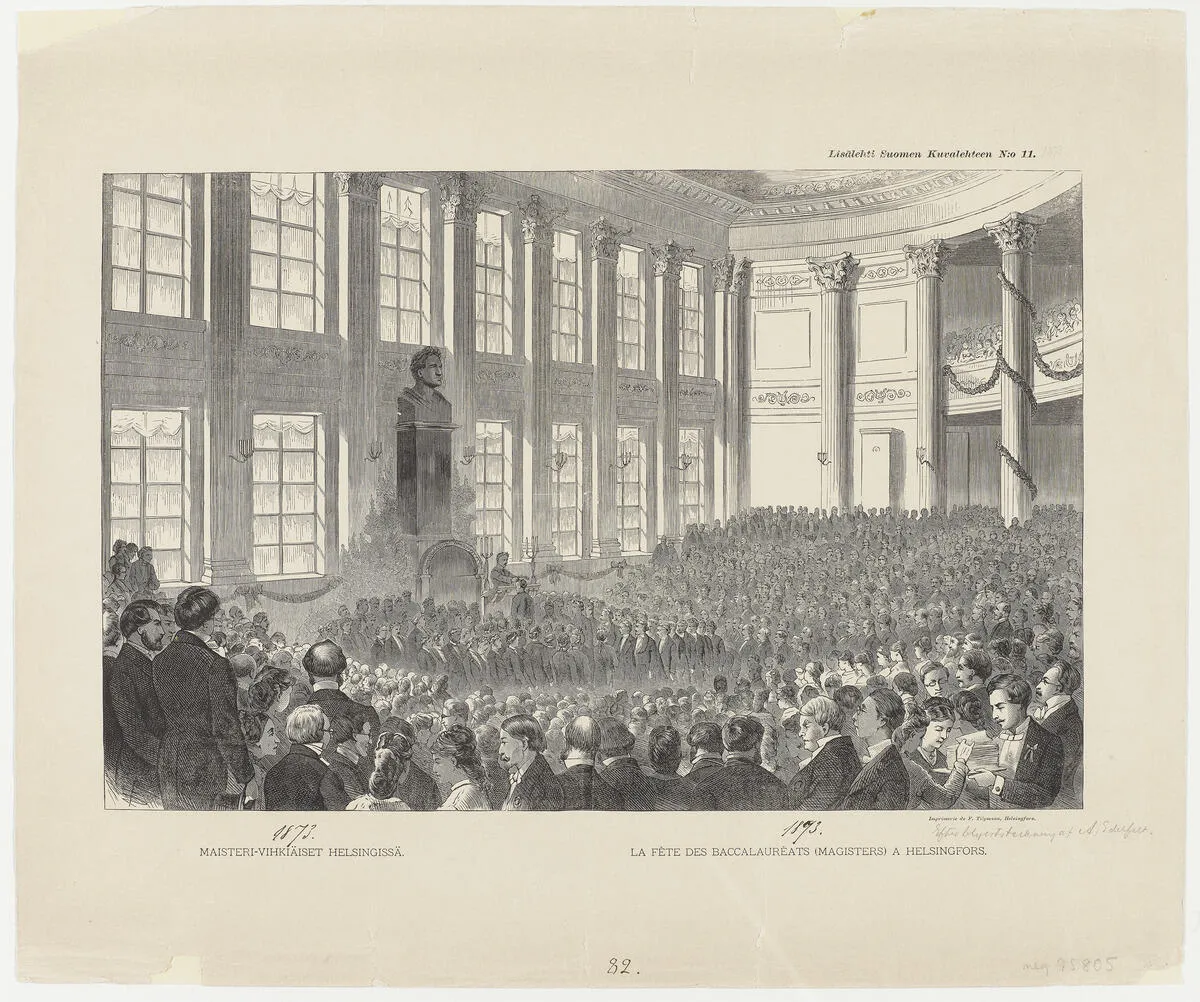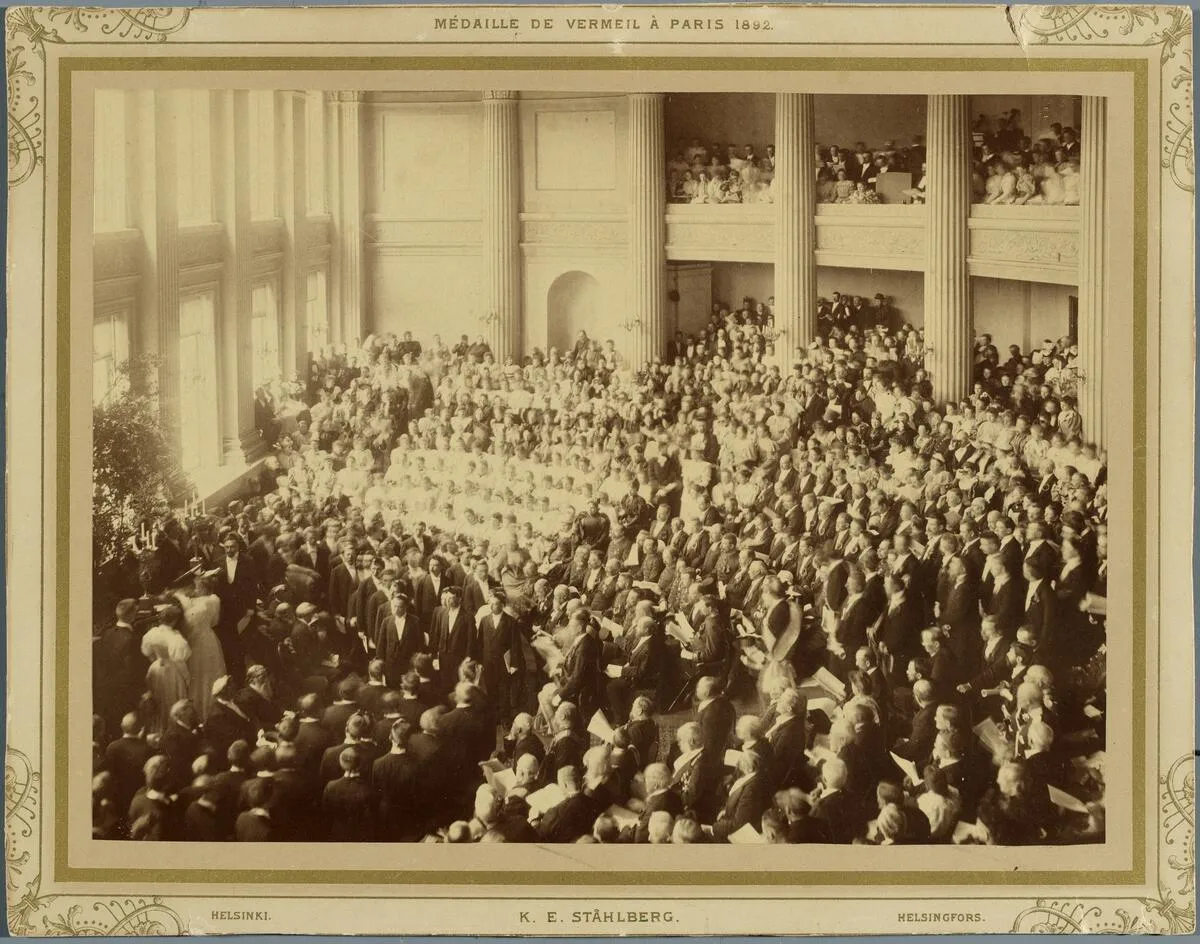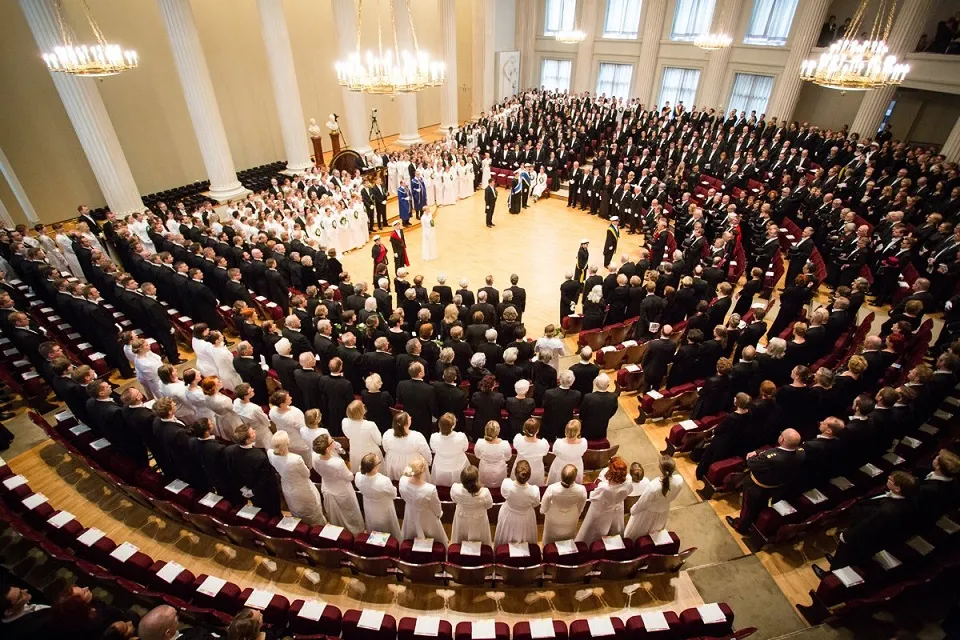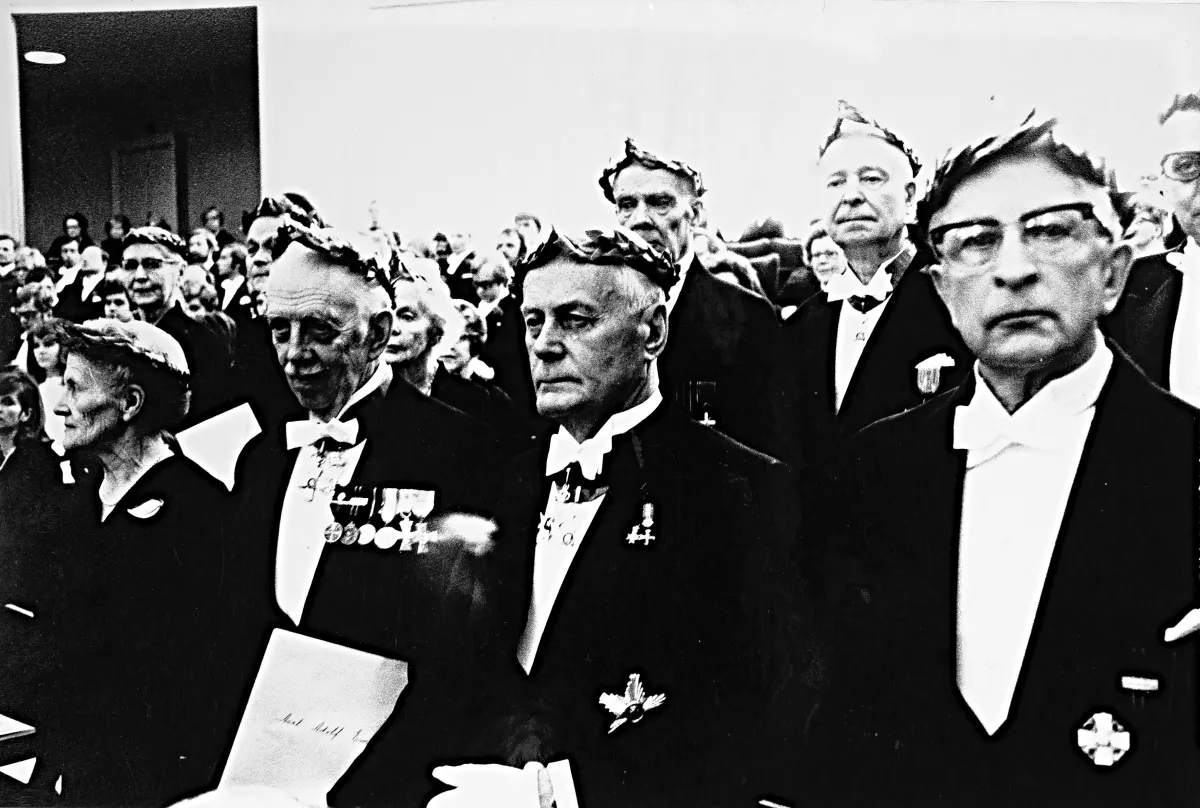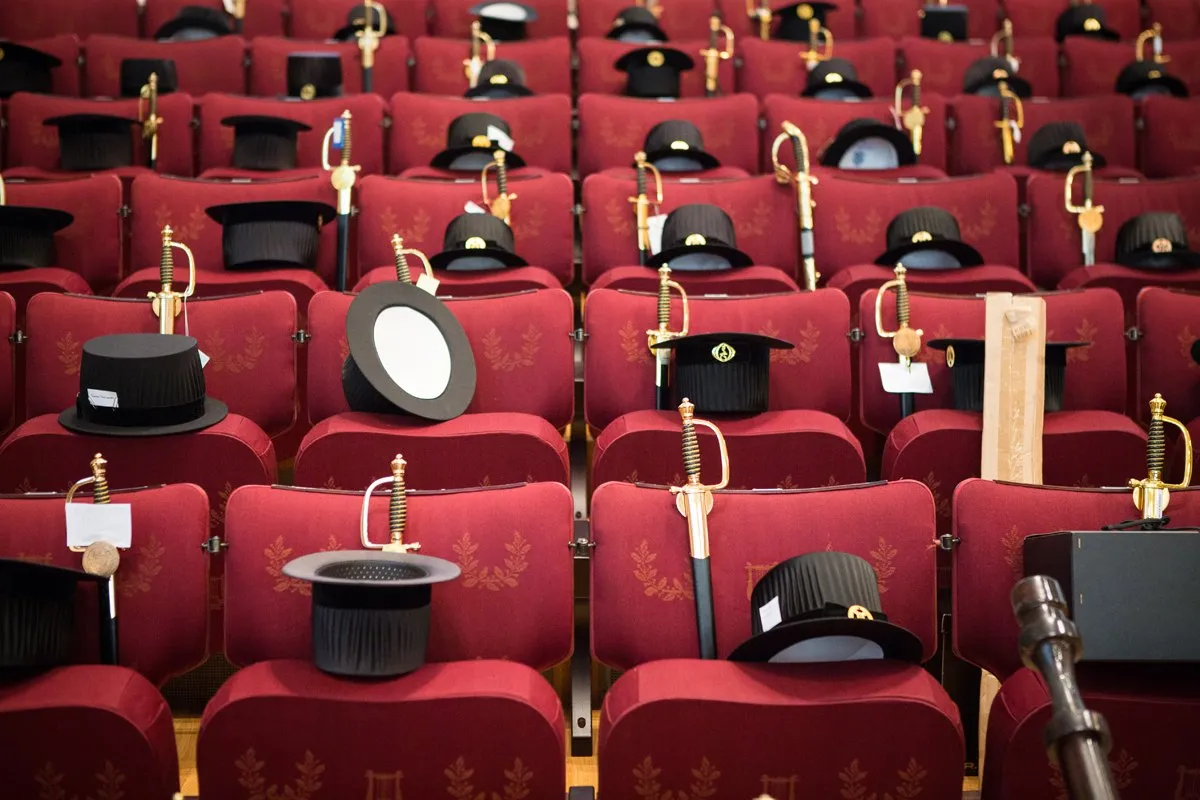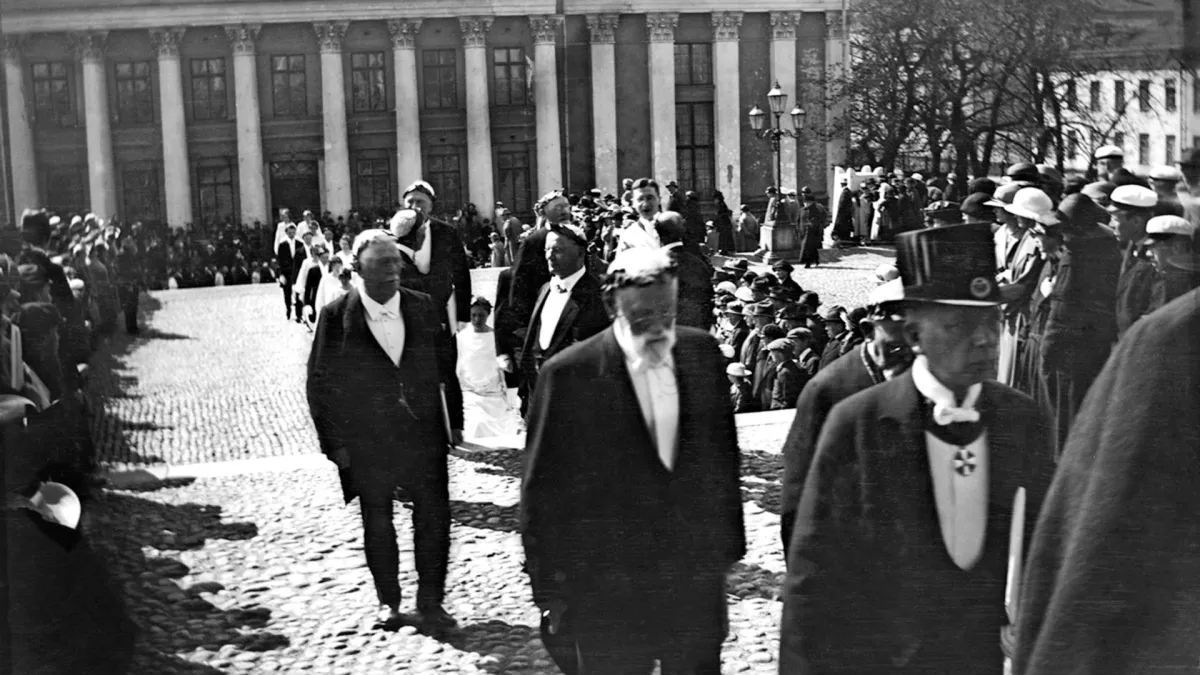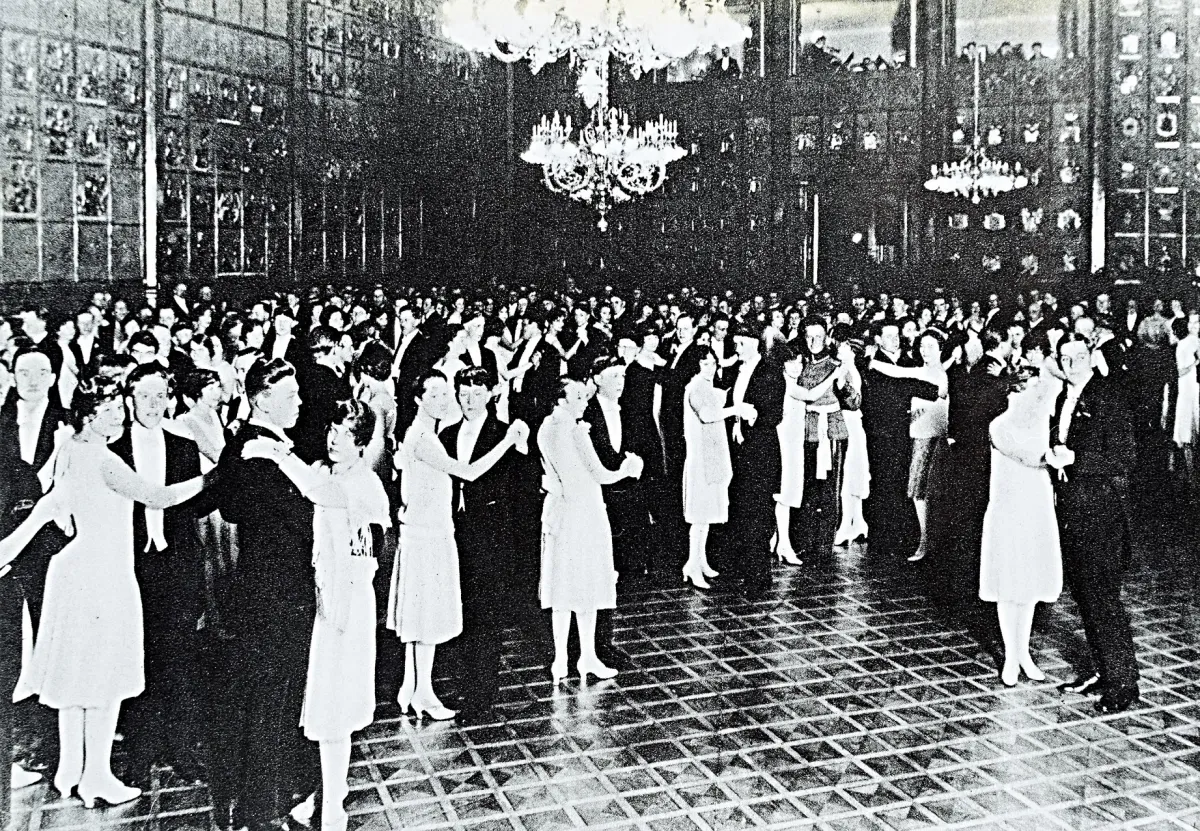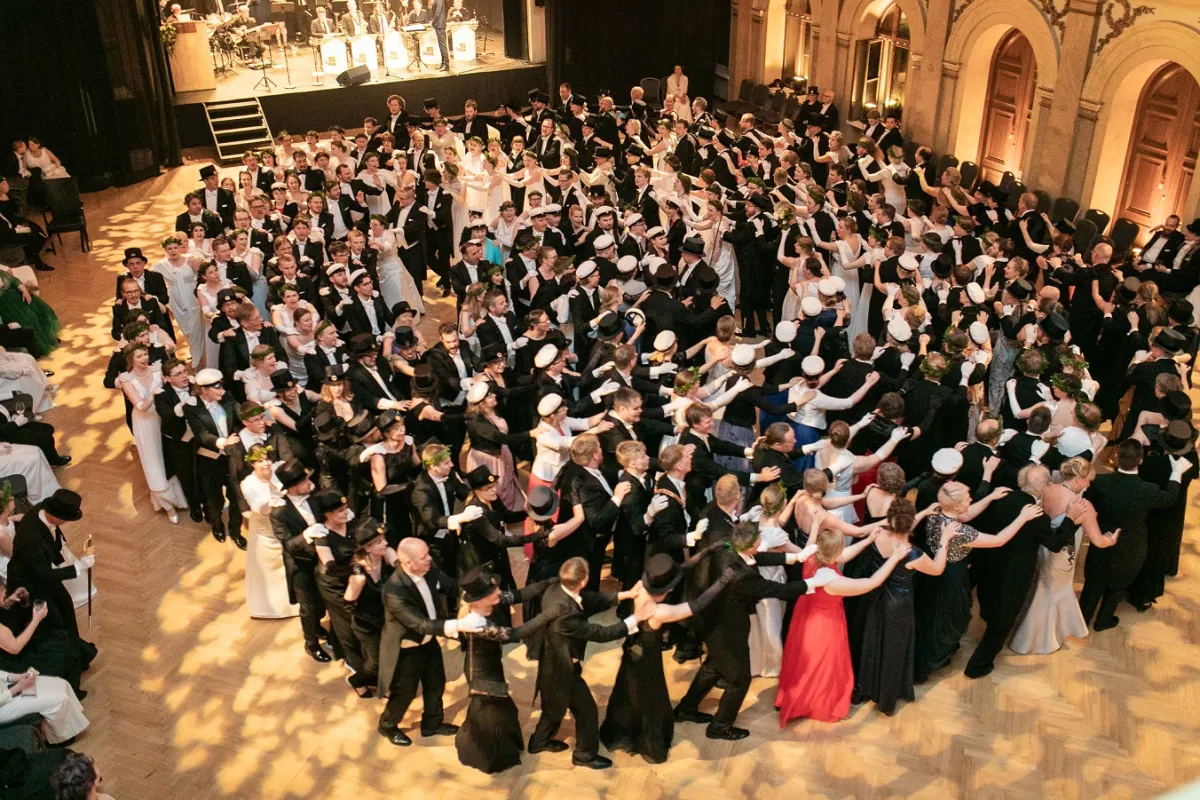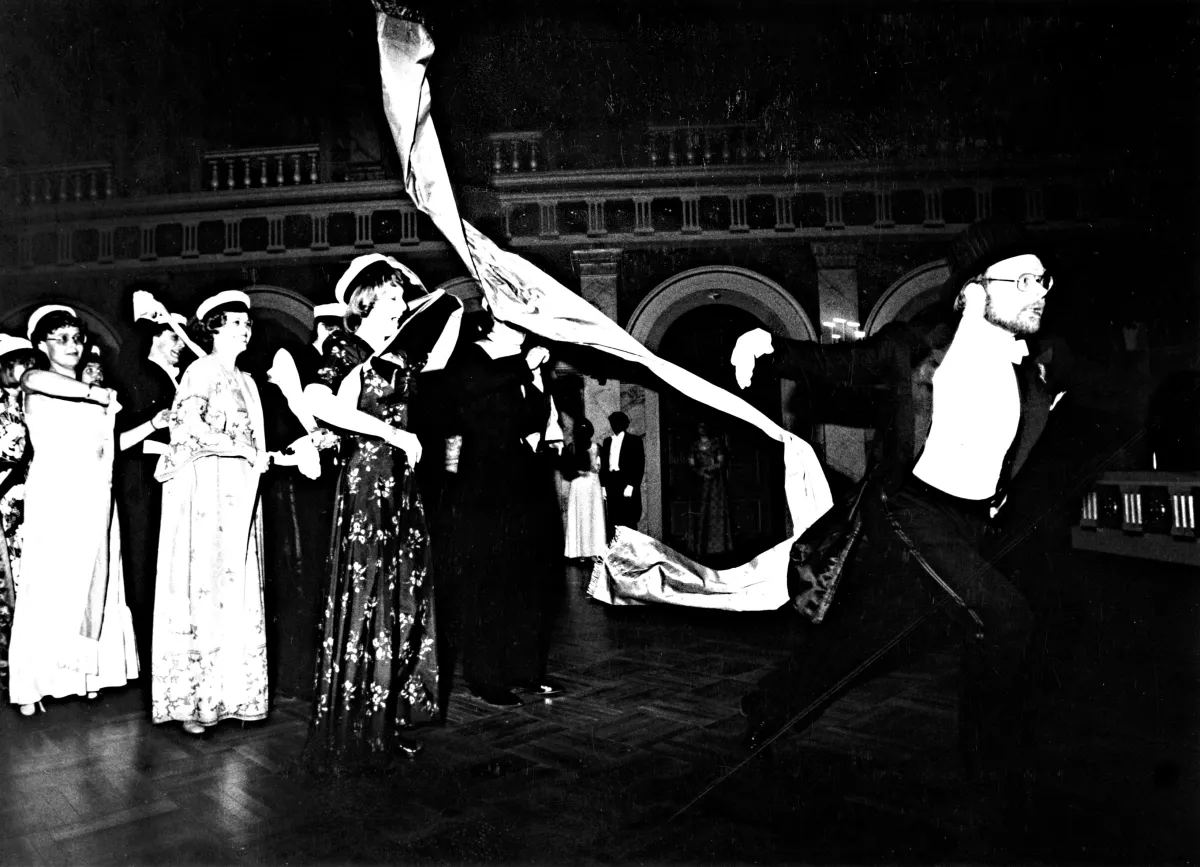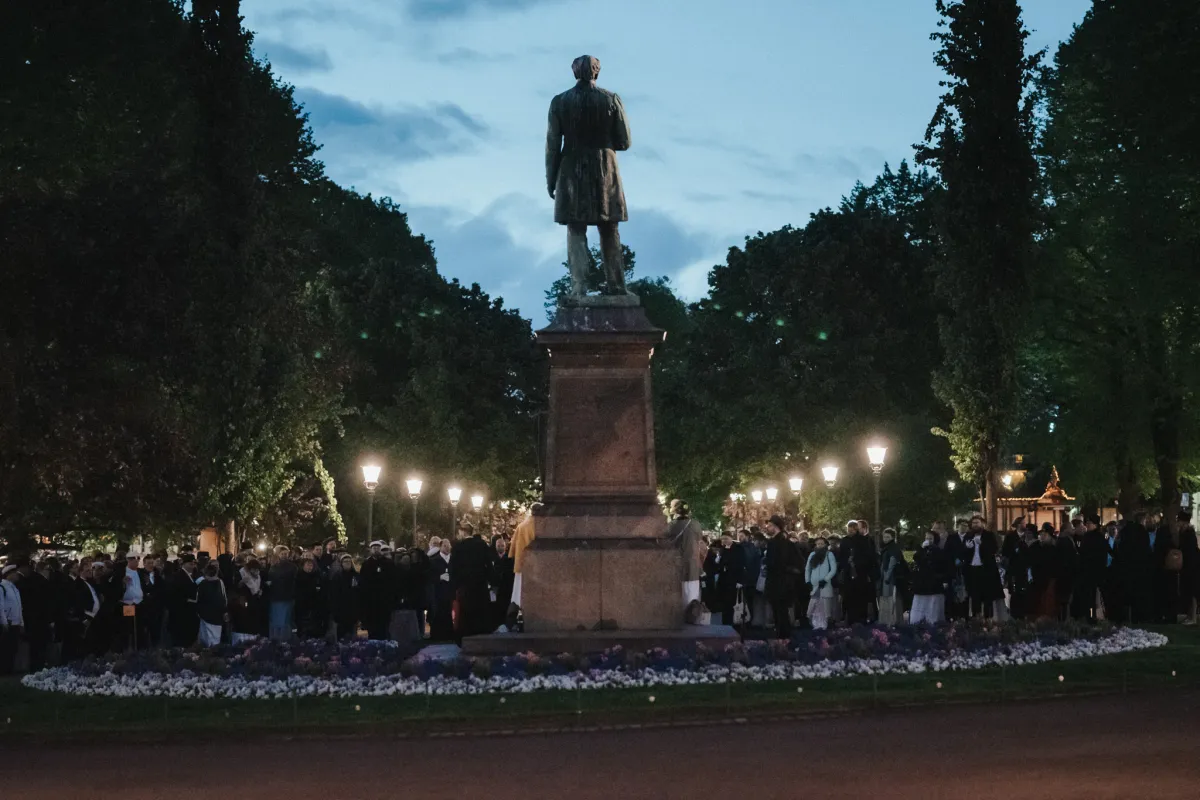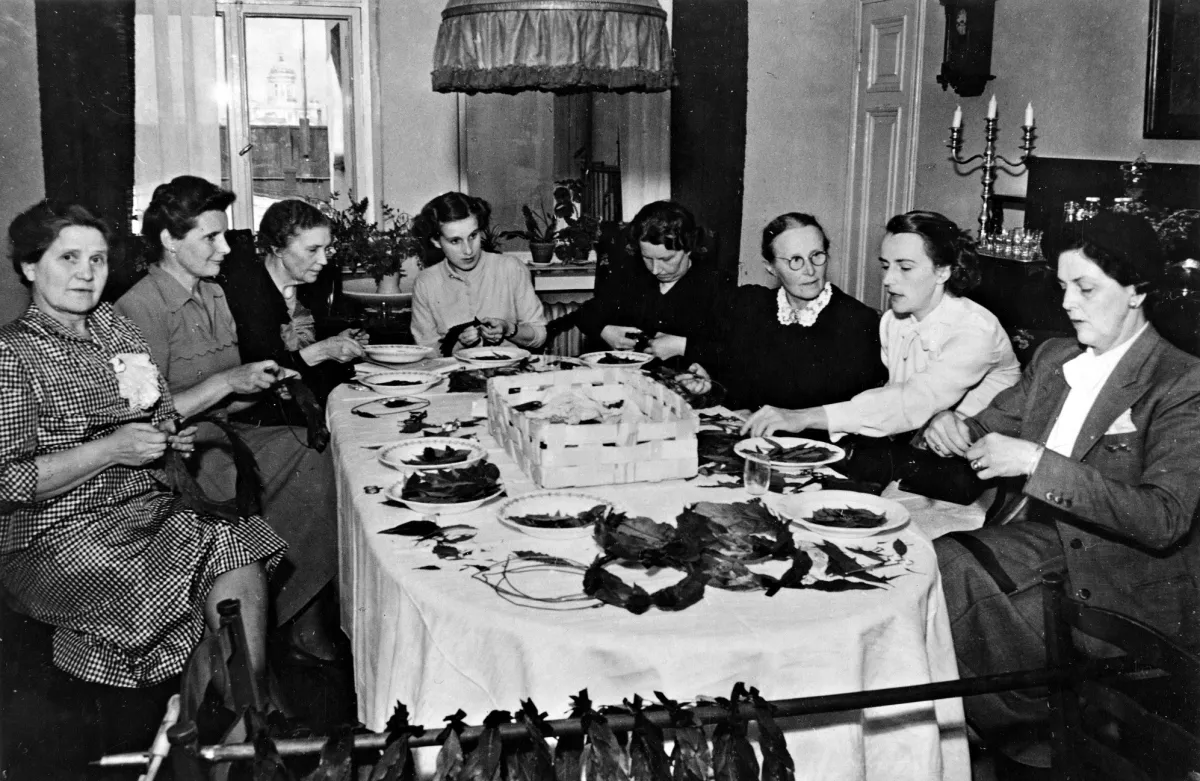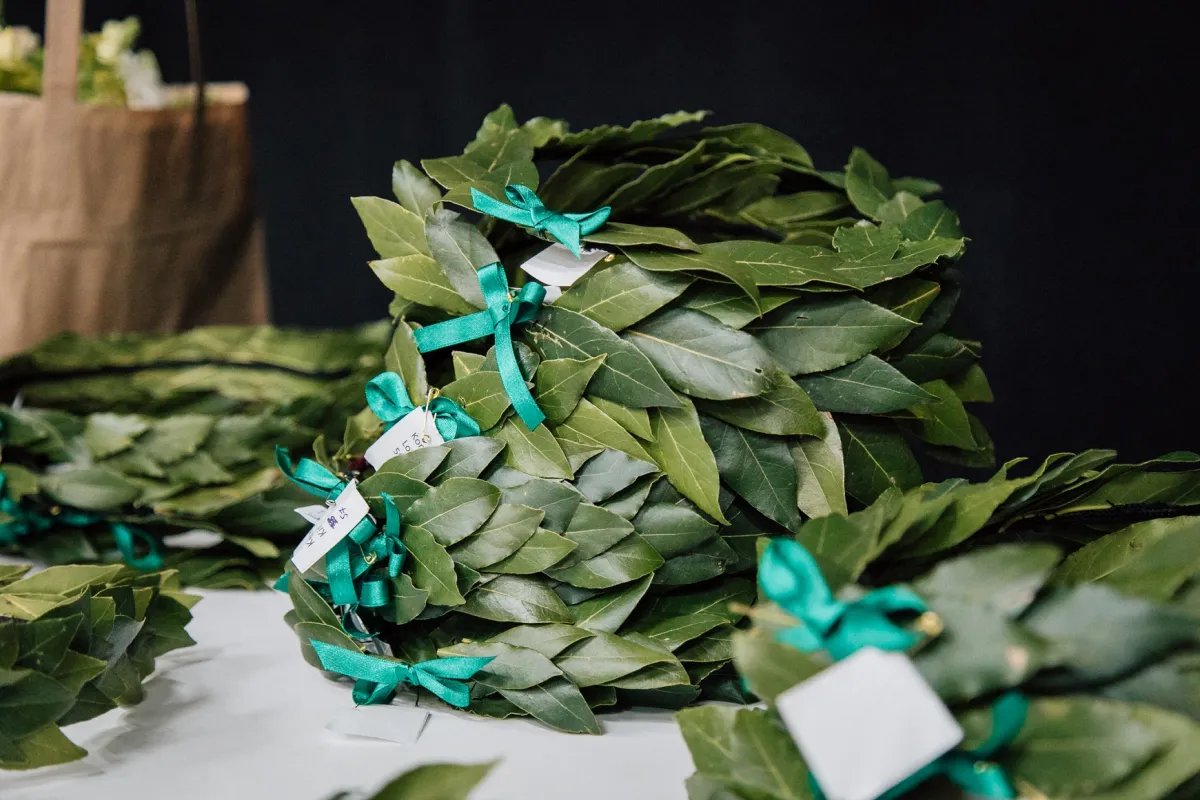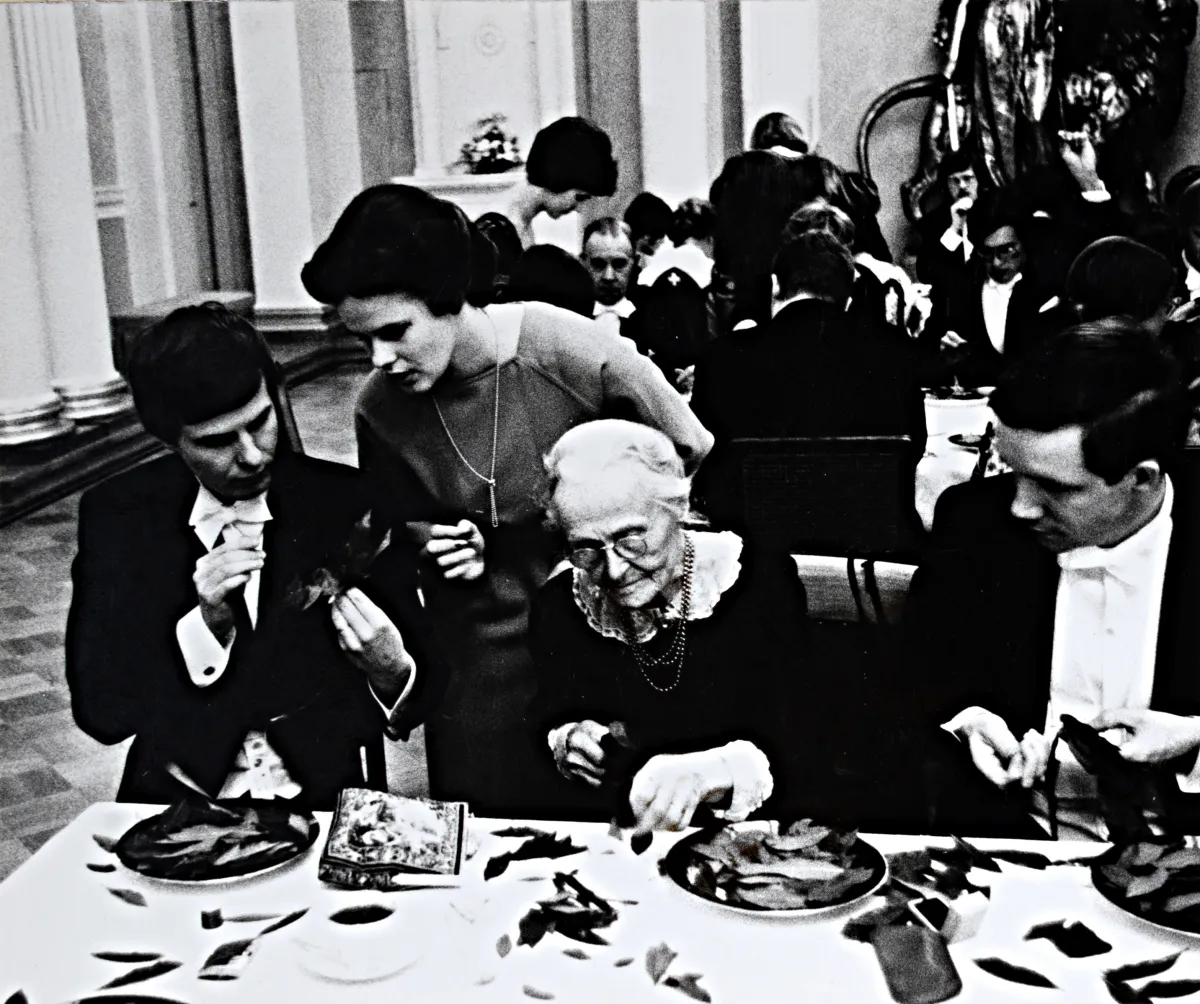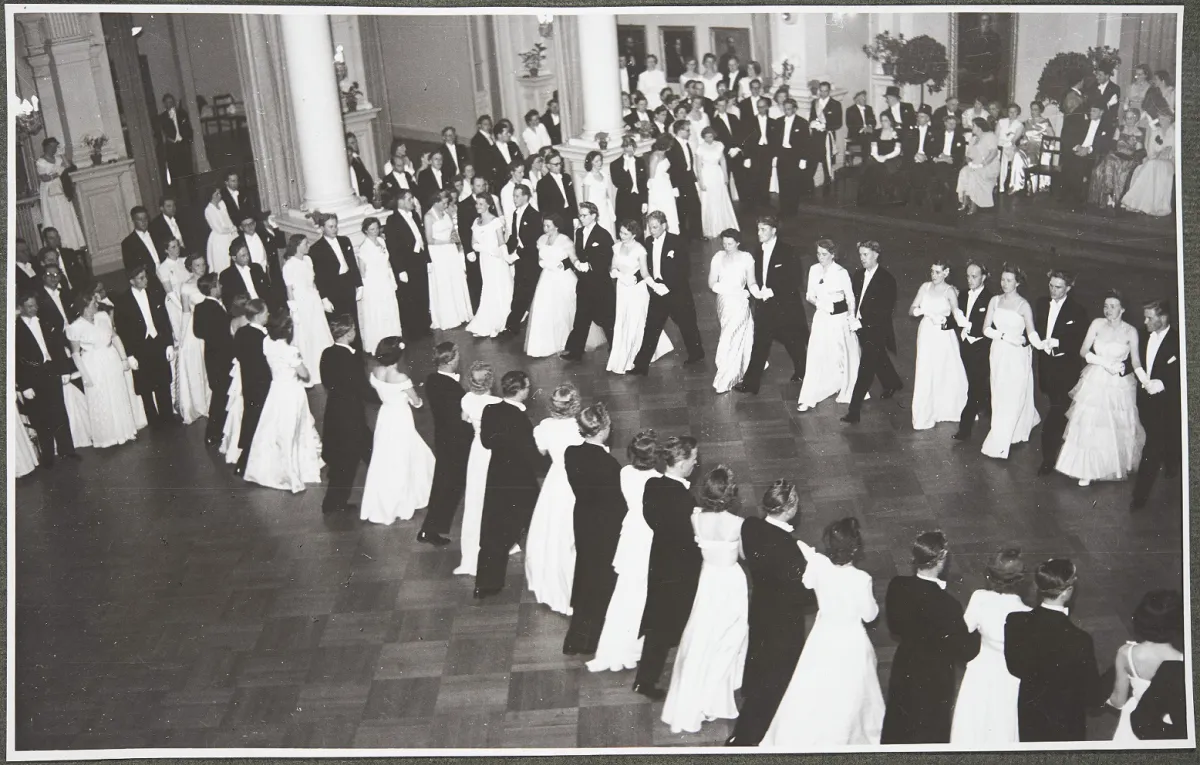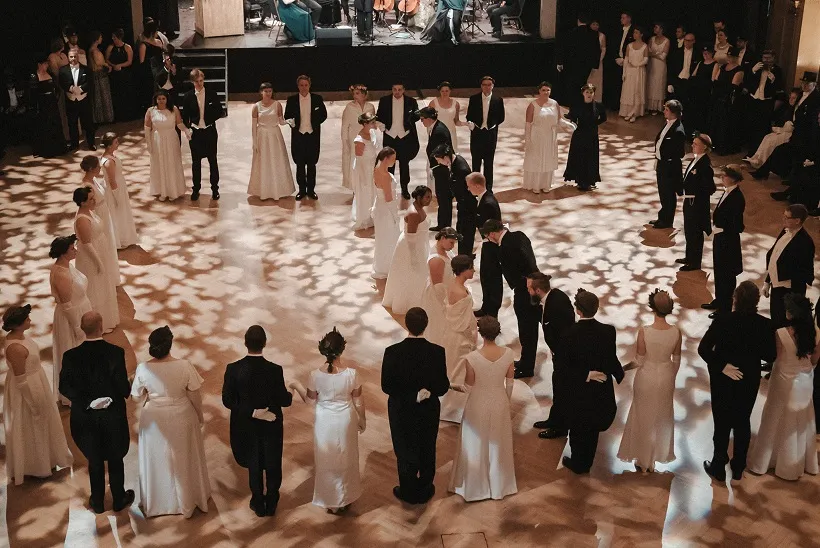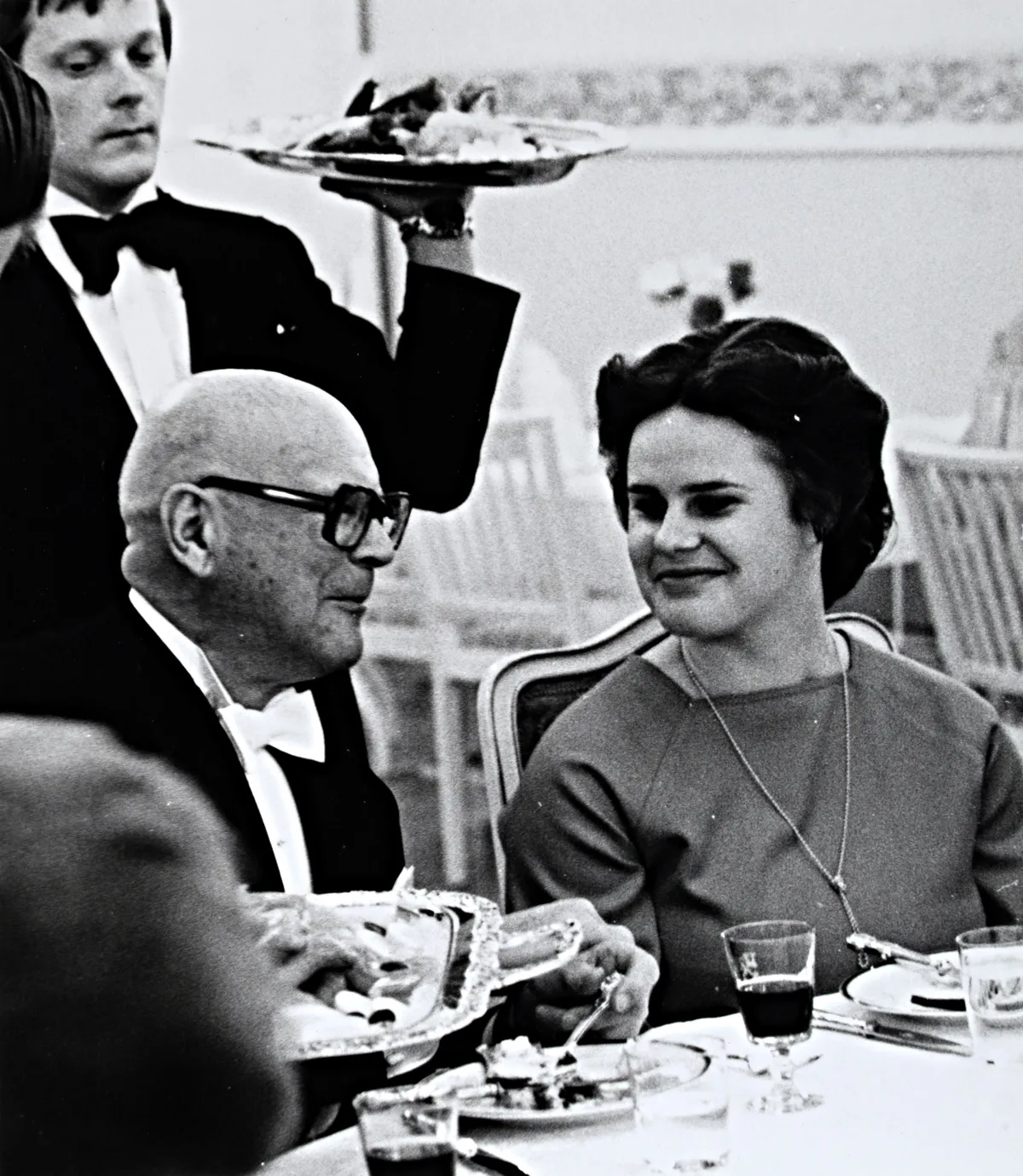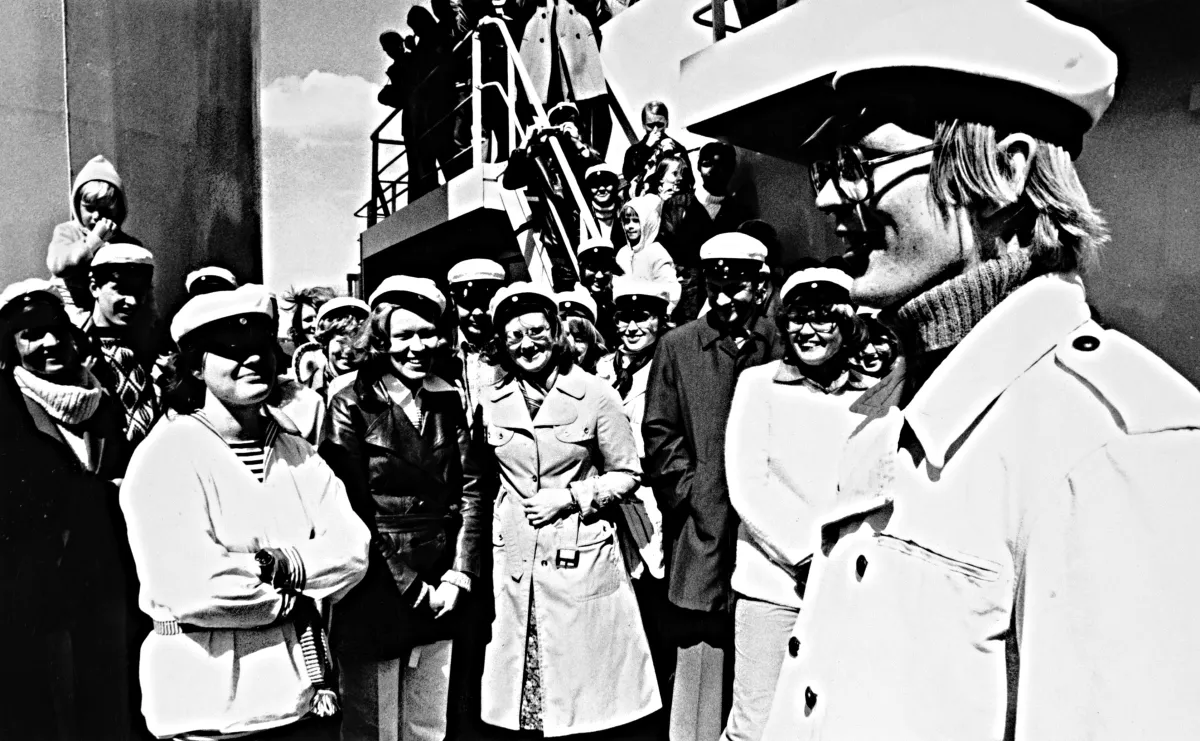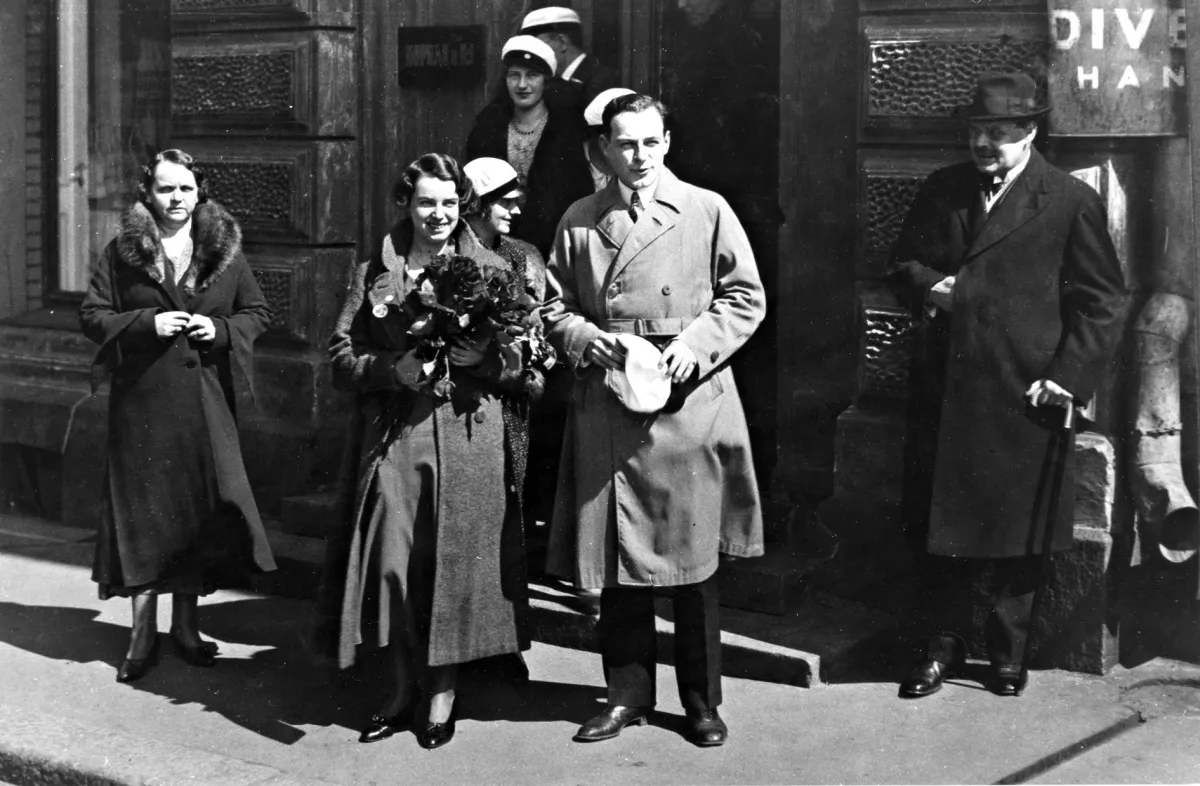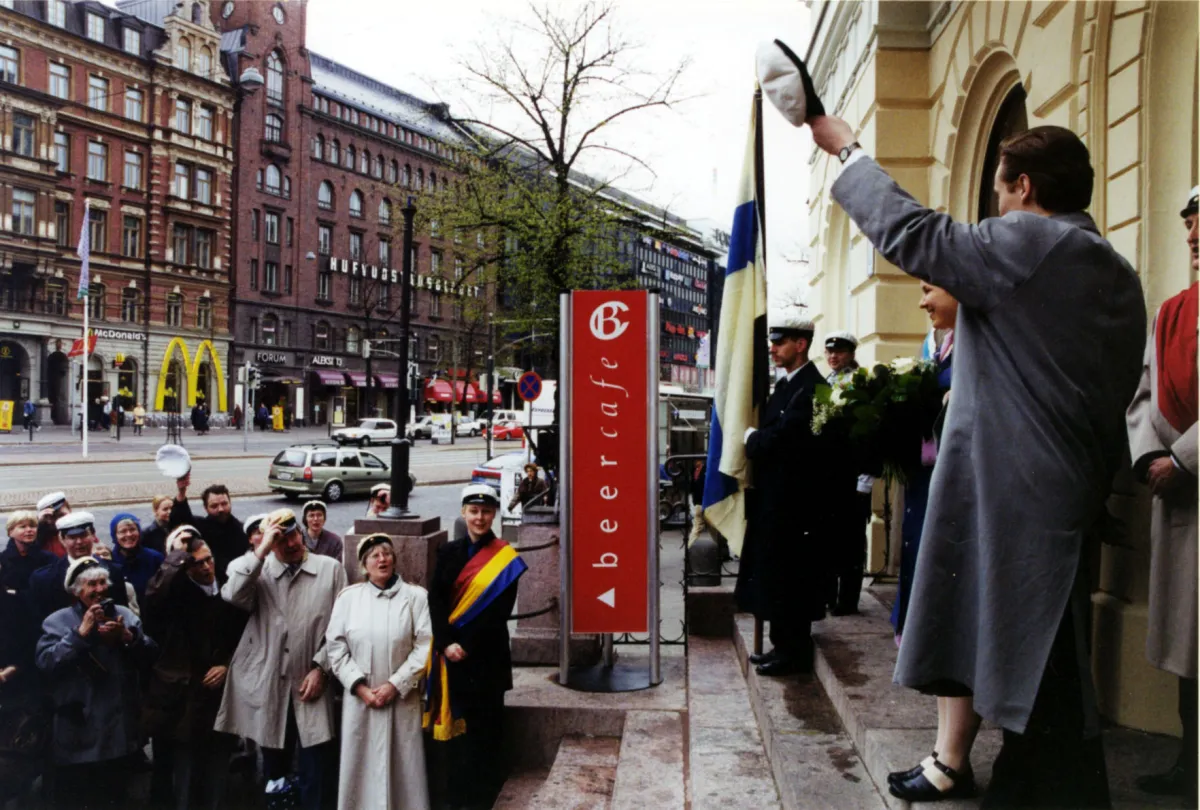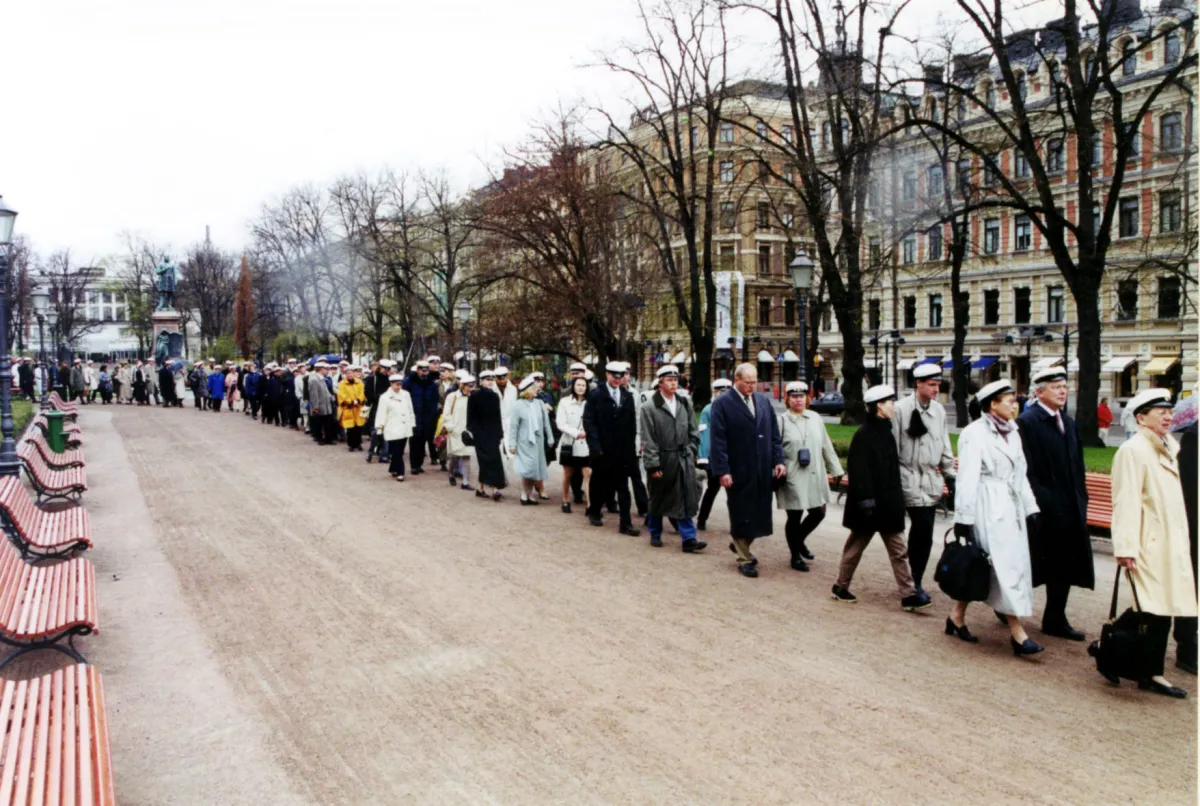Conferment tradition
With some changes and adaptations, conferment ceremonies have been part of Finnish academic traditions throughout the centuries. It is rare for any festive ceremony to remain largely unchanged since the early days of its inception. Conferment ceremonies are indeed a prime example of truly well-preserved intangible cultural heritage. The tradition of confirming master’s degrees was added to the Finnish National Inventory of Living Heritage in 2017.
Conferment ceremonies date back to the Middle Ages: The universities of Bologna and Paris held such ceremonies as early as the 13th century. At the University of Helsinki, formerly the Academy of Turku from 1640 to 1827 and the Imperial Alexander University of Finland from 1827 to 1918, the practice of holding conferment ceremonies was established early, as the first ceremonial conferment of degrees was held by the Faculty of Philosophy in 1643, only three years after the founding of the Academy. Since then, the tradition has continued almost uninterrupted and has been adopted by other faculties and universities. The conferment ceremony of the Faculty of Philosophy at the University of Helsinki continues to be the largest such ceremony in Finland.
At the Academy of Turku, the conferment ceremonies of the Faculty of Philosophy were celebrated in an almost unchanged manner as one-day events for conferring only master’s degrees until the early 19th century. The ceremony began with a get-together at the conferrer’s home, from where the graduands walked in a procession to the Academy building to be conferred with their degrees by the conferrer. Many features of present-day conferment ceremonies, such as processions and the ceremonial question presented to the highest ranking master graduand, were already present in these early ceremonies. The symbolism related to conferment ceremonies has also been preserved unchanged throughout the centuries. For instance, the laurel wreath served as the symbol of the achievements of master’s graduates already in the 18th century. Likewise, the ceremony itself continues to start with the conferrer’s speech and end with the speech by the second highest ranking graduand. The conferment festivities included three events: the ceremony of conferring degrees, a church service and a banquet. The Academy operated in modest settings and degrees were conferred on men only.
In the 19th century, the University played a central role in society with conferment ceremonies and other academic festivities being almost the only public celebrations in the Grand Duchy of Finland. These festivities offered the political elite and educated class an opportunity to get together at a time of underdeveloped media and long distances. Consequently, conferment ceremonies had great social and national significance. In the course of the 19th century, the conferment ceremony traditions acquired many features that have survived to date, such as the conferment of jubilee masters and the conferment of doctoral degrees at the same ceremony with the conferment of master’s degrees. In the 1850s singing the national anthem of Finland became an established part of the ceremonies, and in the 1870s, the duration of the celebrations stretched to three or four days. New events were added, such as the conferment ball in the 1880s, when a perfect venue became available with the completion of a new student building (today known as the Old Student House). This also meant that conferment ceremonies attracted more participants and evolved into grand social events. The history of these ceremonies is well known because the press covered them extensively.
Specifically Finnish features
Gradually the practice of conferring master’s degrees at conferment ceremonies died out in other countries while in Finland the festivities developed features of their own. One uniquely Finnish speciality is the selection of the ceremonial or official wreath weaver (originally wreath weaveress). Master's conferment ceremonies in Helsinki were already seen in the 1840s as a Finnish tradition that strengthened Finnish national identity. At the same time, master's conferment ceremonies had already disappeared from universities in many other countries, but in Finland, the academic conferment festivities and their symbols were associated with patriotism and therefore preserved. During the Faculty of Philosophy's 1850 conferment ceremony, the song Vårt land ("Our Land") was sung at the end of the conferment act for the first time, becoming an established part of the conferment programme. At the same time, because of the nationalistic spirit, the whole tradition was threatened by the tense relations between the Russian regime and the Finns. In fact, the arrangement of conferment ceremonies was possible only with the consent of the Russian Emperor.
Once Finland became independent, the tradition could continue uninterrupted. The first ceremonial conferment of degrees in the newly independent Finland took place in 1919. After the Second World War, there was an altogether 14-year break in arranging conferment ceremonies; the previous break of equal duration goes back to the 18th century and the time of the Great Northern War. After such a long pause the arrangements proved challenging, for the many minute details of the ceremony were almost forgotten. This gave rise to the practice of putting together a commemorative publication of each conferment ceremony held. In the 1970s the conferment of degrees was considered old-fashioned and elitist, and the ceremonies became more low-key. However, in the 1980s attitudes changed, and conferment ceremonies rose to new heights in popularity.
Conferment ceremonies have their roots in European academic traditions, but developed into a specifically Finnish cultural phenomenon. Throughout the centuries, it has been agreed that celebrating the achievements of master's and doctoral graduates in a splendid manner is part and parcel of academic life. The tradition of conferment ceremonies has been considered to be a valuable component of Finnish academia, retaining its vigour even through difficult times. Yet, the tradition has evolved in new directions as each ceremony and its organising committee have attempted to add a new touch to the centuries-old ritual.
The first conferment ceremony of the Faculty of Philosophy was held in 1643 at the Academy of Turku, which had been granted the right to confer doctoral, master’s, and baccalaureus (now equivalent to a bachelor’s) degrees by the founding charter issued by Queen Christina and the regency council. The model for the conferment ceremonies was brought to Turku from Sweden and Germany, and until the mid-19th century, the government sought to regulate the number of graduands to prevent the conferment of the esteemed master’s degree to an excessive or underqualified number of individuals.
The Faculty of Philosophy conferred only master’s degrees until the early 19th century, as it served as a preparatory faculty for all university students before they advanced to higher professional faculties. The titles of Master of Philosophy and Doctor of Philosophy were not yet distinct in the 17th and 18th centuries, and it was common for graduates to receive the combined title of Magister ac Doctor Philosophiae during the master’s conferment ceremony. In the statutes of 1828, the degrees of master and doctor were formally separated. The first conferment ceremony in Helsinki took place in 1832, but the first Doctors of Philosophy were not conferred until 1840. At the same time, the pressure to limit the number of participants in the ceremony subsided, and the event began to evolve into a more voluntary celebration marking the conclusion of one’s studies.
In the late 19th century, the language question, concerning the status of the Finnish and Swedish languages, became a central issue in student politics. This question began to influence conferment ceremonies as well. For the first time, the Finnish language was used in speeches at the Faculty of Philosophy's conferment ceremony in 1864, a year after the language decree was issued. Eventually, language politics became evident in nearly all aspects of the ceremonies, including the choice of languages for speeches, poems, and cantatas, as well as in the elections of the official wreath weavers and gratists. The language disputes surrounding the ceremonies reached a peak in 1903, preventing the Faculty of Philosophy's conferment ceremony from being held altogether.
The participation of women in the Faculty of Philosophy's conferment ceremonies brought changes and diversification to the program. New additions included the wreath-weaving ceremony followed by a dinner on the eve of the main conferment day, and excursions on the day after the conferment, prior to the ball. Thus, the ceremonies expanded into three-day events.
In the 1932 conferment ceremony of the Faculty of Philosophy, history was made when, for the first time, the head of state participated in the event as a jubilee master from the 1882 conferment. The president at the time was Pehr Evind Svinhufvud, affectionately known as "Ukko-Pekka," and his presence naturally added a unique prestige to the entire event. Jubilee Master Svinhufvud invited all the graduands with their wreath weavers and wreath makers, as well as the doctors with their swords and hats, to the Presidential Palace for a coffee reception, which replaced the customary boat trip.
The 2014 conferment ceremony was the largest in history to date, with 620 graduands participating. Since then, the Faculty of Philosophy has organized ceremonies more frequently than before. The previously established four-year interval has typically been reduced to two years to accommodate as many participants as possible. This change has led to the emergence of so-called "new conferments" that do not have a direct predecessor 50 years in the past. The strong jubilee tradition within conferment ceremonies, however, continues to honor the event from 50 years prior by inviting those who graduated at that time to participate again as honored guests, known as jubilee graduands.
In 2023, the University of Helsinki celebrated a jubilee year in honor of the Faculty of Philosophy’s 100th conferment ceremony. One of the goals of this jubilee year was to enhance the university community’s positive self-image by highlighting the enduring, unique, and intergenerational intangible cultural heritage, while recognizing the community’s well-being and diversity of voices. The year 2023 was also Finland’s Year of Living Heritage, commemorating the 20th anniversary of UNESCO’s convention on intangible cultural heritage and Finland’s 10 years as a member state of the agreement.
Previously, only doctoral degrees were conferred in the Faculty of Pharmacy. Starting in 2023, however, pharmacists (proviisori graduates) have also been invited to participate as master’s graduands in the Faculty of Philosophy’s conferment ceremonies.
Recordings
Conferment ceremonies held in Turku:
1. 4.5.1643
2. 4.5.1647
3. 2.5.1650
4. 3.5.1653
5. 6.6.1656
6. 11.6.1661
7. 24.5.1664
8. 28.5.1667
9. 4.6.1672
10. 27.7.1677
11. 24.11.1679
12. 7.12.1682
13. 21.7.1685
14. 26.7.1688
15. 25.11.1691
16. 25.11.1694
17. 14.12.1697
18. 14.12.1700
19. 14.12.1703
20. 17.6.1707
21. 15.2.1712
22. 14.6.1726
23. 25.6.1729
24. 4.7.1732
25. 11.7.1735
26. 14.7.1738
27. 18.7.1741
28. 18.7.1745
29. 3.8.1748
30. 30.7.1751
31. 25.7.1754
32. 2.7.1757
33. 25.8.1760
34. 6.7.1763
35. 29.7.1766
36. 6.7.1769
37. 22.7.1772
38. 28.7.1775
39. 30.6.1778
40. 20.6.1782
41. 22.6.1786
42. 14.7.1789
43. 22.6.1792
44. 23.6.1795
45. 26.6.1798
46. 15.6.1802
47. 28.6.1805
48. 6.7.1810
49. 13.10.1815
50. 28.6.1819
51. 27.6.1823
52. 10.7.1827
Conferment ceremonies held in Helsinki:
53. 21.6.1832
54. 21.6.1836
55. 20.7.1840
56. 21.1.1844
57. 22.6.1847
58. 19.6.1850
59. 30.5.1853
60. 29.5.1857
61. 31.5.1860
62. 31.6.1864
63. 31.6.1869
64. 30.5.1873
65. 31.5.1877
66. 31.5.1882
67. 31.7.1886
68. 30.5.1890
69. 31.5.1894
70. 31.5.1897
71. 30.5.1900
72. 30.5.1907
73. 31.5.1910
74. 29.5.1914
75. 31.5.1919
76. 31.5.1923
77. 31.5.1927
78. 31.5.1932
79. 30.5.1936
15.3.1938 honorary doctors' conferment
80. 31.5.1950
25.5.1952 honorary doctors' conferment
81. 31.5.1957
82. 31.5.1960
83. 31.5.1964
84. 31.5.1969
85. 31.5.1973
86. 27.5.1977
87. 28.5.1982
88. 30.5.1986
89. 1.6.1990
90. 27.5.1994
91. 30.5.1997
92. 2.6.2000
93. 6.6.2003
94. 25.5.2007
95. 28.5.2010
96. 23.5.2014
97. 26.5.2017
98. 24.5.2019
99. 27.5.2022
100. 26.5.2023
101. 23.5.2025
1840
- Paul Heinrich Fuss, mathematician, Imperial Academy of Sciences, St. Petersburg.
- Leonard Gyllenhaal, Sweden. Officer and entomologist.
- Lars Gabriel von Haartman, Vice Chairman of the Economic Department of the Senate of the Grand Duchy of Finland.
- Israel Hwasser, Sweden. Professor emeritus of medicine, Royal Academy of Turku, later relocated to Sweden.
- Jacob Judén, Finnish writer, known under the name Jaakko Juteini.
- Emil Lentz, St. Petersburg. Academician of the Imperial Academy of Sciences and professor at the University of St. Petersburg.
- Peter von Köppen, assistant at the Imperial Academy of Sciences, St. Petersburg.
- Nils Gustav Nordenskiöld, mineralogist and councillor of state.
- Mihail Ostrogradsky, St. Petersburg.
- P. Pletneff, St. Petersburg. Academician and professor at the Imperial University of St. Petersburg, acting rector.
- Carl August Ramsay, senator and privy councillor.
- Robert Henrik Rehbinder, count and minister-secretary of state for Finnish affairs.
- Vasili Shukovski, poet and member of the Imperial Academy of Russia, St. Petersburg.
- Christian von Steven, St. Petersburg. Botanist and entomologist born in Hamina, with a career in Russia.
- Johan Agapetus Törngren, professor of medicine and archiater.
1860
- Matthias Akiander, professor of Russian language and researcher of Finnish history.
- Stepan Baranovski, professor of Russian language, Helsinki.
- Fredrik Cygnaeus, professor of aesthetics and modern literature, Helsinki.
- Sven Gabriel Elmgren, deputy librarian of the university library.
- Elias Lönnrot, professor of Finnish language, compiler of the Kalevala.
- Johan Wilhelm Snellman, professor of ethics and scientific systems, philosopher, journalist, and head of the financial department.
1869
- Alexander Armfelt, count and minister-secretary of state for Finnish affairs, St. Petersburg.
1877
- Fredrik Pacius, university music teacher and composer, considered the "Father of Finnish Music."
- Fredrik Julius Petersen, professor of Roman literature, Helsinki.
- Robert Alfred Renvall, librarian of the Finnish Literature Society (SKS) and compiler of biographical registers.
1882
- Eduard Viktor Eugène Hisinger, industrialist and patron of Fagervik Ironworks, baron, member of parliament, and botanist.
- Julius Leopold Fredrik Krohn, university lecturer in Finnish language, folklore researcher, and writer of the first Finnish-language master's thesis.
1897
- Emanuel Wilhelm Bergman, archivist of the Royal State Archives, Sweden.
- Anton Gabriel Blomqvist, director of the Evo Forestry Institute, known as the "Father of Finnish Forestry."
- Artur Edvard von Bonsdorff, physician and parliamentarian.
- Karl Gabriel Leinberg, teacher, school and church historian, and principal of the Jyväskylä Teacher Seminary.
- William Nylander, botanist, particularly renowned for his studies on lichens.
1907
- Juhani Aho, author and journalist.
- Paavo Emil Cajander, poet and translator.
- Josef E. Mandelstam, professor of Russian language.
- Walter Magnus Runeberg, sculptor.
- Anders Thiodolf Saelan, physician, botanist, and chief physician of the Lapinlahti mental hospital.
- Robert Adolf Armand Tigerstedt, physiologist and physician.
1914
- Jean Sibelius, composer.
1919
- Carl Gustaf Emil Mannerheim, regent, general, and commander-in-chief of the White Finnish Army.
- Pehr Evind Svinhufvud, former regent, head of the Senate, jurist, and independence activist.
1923
- Akseli Waldemar Gallen-Kallela, artist.
- Mauritz Emil Fredrik Hallberg, parliamentarian.
- Robert Fredrik Hermansson, professor of constitutional law, legal scholar, and parliamentarian.
- Erik "Eero" Nikolai Järnefelt, drawing instructor at the university's drawing hall.
- Axel August Lähteenkorva, folklore researcher and collector.
- Rabbe Axel Wrede, professor of civil law, parliamentarian, and legal scholar.
1927
- Matthias Johann Eisen, professor of folklore, University of Tartu, Estonia.
- Bernhard Rudolf Estlander, teacher and historian.
- V. A. Koskenniemi, poet and rector of the University of Turku.
- Otto Manninen, poet.
- Johan Magnus Salenius, teacher and historian.
- Otto Alexander Paul Trüstedt, mining engineer and geologist, discoverer of the Outokumpu mine.
- Emma Irene Åström, teacher and the first woman to earn a master’s degree in Finland.
1932
- Bertel Johan Sebastian Gripenberg, poet.
- Robert Kajanus, composer, conductor, and university music instructor.
- Gottlieb Eliel Saarinen, architect.
1936
- Tor Harald Carpelan, genealogist and university secretary.
- Heikki Valentin Klemetti, composer, arranger, and choir conductor.
- Frans Emil Sillanpää, author.
- Wanold Wrydon Wilkman, state geologist.
1938
- Herbert Hoover, former President of the United States.
1950
- Wäinö Waldemar Aaltonen, sculptor.
- Rolf L. Grönblad, dentist and phycologist.
- Eirik Mikael Hornborg, historian and member of parliament.
- Eino Armas Kalima, theatre director and producer.
- Aina Johanna Lähteenoja, historian and member of parliament.
- Vilho Petter Nenonen, artillery general of the Finnish Army.
- Selim Palmgren, composer.
- Maila Talvio (née Mikkola), author.
- Harald Öhquist, lieutenant general and Jaeger.
1952
- Gustaf VI Adolf, King of Sweden.
1957
- Axel Erik Heinrichs, Lieutenant General of the Finnish Army and Jaeger.
- Wolter Edvard Hellén, custodian of entomological collections at the Finnish Museum of Natural History.
- Alfons Hällström, engineer and inventor, known for developing pine soap.
- Armas Järnefelt, composer and professor.
- Ilmari Kianto, author.
- Lauri Johannes Kuusanmäki, teacher, historian, and ethnographer.
- Kaarlo Matti Marjanen, lecturer in speech technique at the university, reciter, author, and poet.
1960
- Erik Alfred Torbjörn "Björn" Collinder, professor of Finno-Ugric languages, Uppsala University, Sweden.
- Rabbe Arnfinn Enckell, writer, poet, and painter.
- Juho Kujola, researcher of Ludian and Karelian languages.
- Toini Ida Elise Melander, librarian and book history researcher.
- Yrjö Reenpää, philosopher and physiologist.
- Tyyni Maria Tuulio, author, literary scholar, and translator.
1964
- Urho Kaleva Kekkonen, President of Finland.
- Martti Eero Kaila, professor of psychiatry and head of Lapinlahti Mental Hospital.
- Otto Toivo Lyy, poet and translator.
- Swan Ohto Antero Manninen, civil servant, translator, and non-fiction writer.
- Akseli Aapeli Saarisalo, emeritus professor of Oriental literature.
- Karl Henrik Sten Stockmann, director of Stockmann department store.
- Margareta Lovisa von Frenckell-Thesleff, literary scholar and author.
- Bengt Axel von Törne, composer and non-fiction writer.
1969
- Paul Ariste, linguist, University of Tartu, Estonia.
- Torsten Valdemar Gustafsson, professor of theoretical physics, Lund University, Sweden.
- Paavo Juhani Haavikko, author.
- Marta Hirn, historian and caretaker of the National Museum’s photo collections.
- Pentti Emerik Valdemar Järvi, director of Jokioinen Observatory.
- Erkki Oskari Kivinen, university rector.
- Eino Aulis Leskinen, linguist and editor of the dictionary of Karelian dialects.
- Francis Peabody Magoun, professor of English, Harvard University, Cambridge, Massachusetts, USA.
- William Richard Mead, professor of geography, University of London, United Kingdom.
- Atli Hagar Olsson, writer and literary critic.
- John Wilhelm Ryselin, senior engineer, co-developer of copper flash smelting technology.
- Yrjö Petteri Sivola, engineer and developer of sulfite pulp cooking and recovery methods for cooking chemicals.
- Carl Eric Sonck, professor of dermatology and botanist.
- Erik Thuneberg, physician and botanist.
- Elias Gustaf Adolf Wessén, professor of Nordic languages, Stockholm University, Sweden.
1973
- Lauri Emil Aho, mayor and city manager of Helsinki.
- Tauno Pietari Angervo, CEO of Pohjola Insurance Company.
- Nikolai Nikolaivitsh Bogoljubov, theoretical physicist, Academy of Sciences of the USSR, Soviet Union.
- Henrik V. Grönroos, university library assistant responsible for evacuating library collections during the war.
- Louis Leonor Hammerich, professor of Germanic philology, University of Copenhagen, Denmark.
- Armas K. E. Holmio, professor, Finlandia College, Hancock, Michigan, USA.
- Arvi J. Huuskonen, medical councillor.
- Kaarlo Arvi Kivimaa, author, poet, and theatre director.
- Erik Johan Ragnar Kreuger, industrial counsellor and bird enthusiast.
- Keijo Johannes Mikola, director of the Military Historical Research Institute.
- Gyula Ortutay, ethnographer, Budapest, Hungary.
- Vilho Suonio Setälä, photographer, journalist, and non-fiction writer.
- Arvo Albin Turtiainen, poet and translator.
- Atos K. Wirtanen, author.
1977
- Arne W. Appelgren, MA, curator of the Ostrobothnian Museum.
- Arno A. Bellack, professor of education, Columbia University, New York, USA.
- Anna Karolina Bondestam, writer, translator, and historian.
- Torbjörn Oskar Caspersson, professor of medicine and biophysics, Stockholm University, Sweden.
- Fedot Petrovitch Filini, Leningrad.
- Frederick William Gehring, professor of mathematics, University of Michigan, Ann Arbor, Michigan, USA.
- Geza Képes, author, Hungary.
- Jorma P. E. Kinnunen, MSc.
- Helmut Klein, Berlin.
- Sten Hjalmar Lindroth, professor of intellectual history, Uppsala University, Sweden.
- Martti Olavi Talvela, opera singer.
- Aale Maria Tynni, poet and Olympic champion.
- Léon Charles Prudent Van Hove, professor of theoretical physics, Utrecht University, Netherlands.
1982
- Erik Valdemar Bergman, composer, academician, professor emeritus of composition, Sibelius Academy.
- Knut Bergsland, professor of Finno-Ugric studies, University of Oslo, Norway.
- Gerald E. Brown, professor of theoretical physics, Stony Brook University, New York, USA.
- Lennart Axel Edvard Carleson, professor of mathematics, Uppsala University, Sweden.
- Nils Thorsten Elias Fries, professor of physiology and anatomy, Uppsala University, Sweden.
- Ragnar Arthur Granit, professor of physiology, Nobel laureate in medicine, Karolinska Institute, Stockholm, Sweden.
- Heikki Hugo Herlin, industrial counsellor.
- Marie-Louise van Herreweghe, professor of psychological education, Ghent University, Belgium.
- Herbert Hunger, professor of Byzantine studies, University of Vienna, Austria.
- Eeva Elisabeth Joenpelto, author.
- Heino Liimets, professor of pedagogy, Tallinn Pedagogical Institute, Estonia.
- Bengt G. Rånby, professor of polymer chemistry, Royal Institute of Technology, Stockholm, Sweden.
- Aleksandr Vasilievitch Sidorenko, minister of geology, Moscow, USSR (posthumous).
- Thomas Henry Warburton, writer and translator.
- Ants Viires, senior researcher in ethnology, Estonian SSR Academy of Sciences, Tallinn, Estonia.
1986
- Alfred V. Aho, head of the computer science division, Bell Telephone Laboratories, New Jersey, USA.
- Gösta Berg, professor and director emeritus, Nordic Museum, Stockholm, Sweden.
- Staffan Helmfrid, professor of cultural geography and rector, Stockholm University, Sweden.
- David E. Hunt, professor at the Ontario Institute for Studies in Education, University of Toronto, Canada.
- Mauri Kalervo Korhonen, photographer, non-fiction writer, mycologist, and assistant conservator at the University Herbarium.
- Lennart Georg Meri, Estonian writer and later the first president of independent Estonia.
- John A. Niemi, professor of adult education, Northern Illinois University, Illinois, USA.
- Marja Annikki Niiniluoto, journalist and translator.
- Lauri (Lassi) Juhani Yrjönpoika Nummi, writer and translator.
- Richard W. Ojakangas, professor of geology, University of Minnesota, Minnesota, USA.
- Els Oksaar, professor of general and comparative linguistics, University of Hamburg, Germany.
- Jean C. Perrot, professor of Finno-Ugric studies, Centre d'Études Finno-Ougriennes, Paris, France.
- Solveig Margareta von Shoultz, writer and poet.
- Kurt Strebel, professor of mathematics, University of Zurich, Switzerland.
- Yrjö I. Toivola, MSc, industrial counsellor.
1990
- Mauno Koivisto, President of Finland.
- Ritva Ahonen-Mäkelä, recitation artist and lecturer in speech communication at the University of Helsinki.
- Sir Michael Atiyah, professor of mathematics, University of Oxford, United Kingdom.
- Arvid Carlsson, professor of neurobiology and pharmacology, University of Gothenburg, Sweden.
- Elias James Corey, professor of organic synthetic chemistry, Harvard University, Cambridge, Massachusetts, USA.
- Albert Lange Fliflet, Magister Artium, translator of Kalevala and Kanteletar into Norwegian.
- Brian Groombridge, professor of adult education, University of London, United Kingdom.
- Jaakko Itälä, Secretary General of the Mannerheim League for Child Welfare, former Minister of Education, key figure in Finland's comprehensive school reform.
- Juri Karaulov, professor of Russian language, USSR Academy of Sciences.
- Eero Kataja, director of Sodankylä Geophysical Observatory.
- Jaan Kross, Estonian writer.
- Rafael Lapesa, academician, director of the Royal Spanish Academy, Madrid, Spain.
- Charles Letteri, professor of education, University of Vermont, Burlington, Vermont, USA.
- A. A. Logunov, academician and rector of Moscow State University, Moscow, USSR.
- Olli V. Lounasmaa, research professor in low-temperature physics, Helsinki University of Technology.
- Marc Van Montagu, professor of genetic technology, Ghent University, Belgium.
- Daniel H. Norris, professor of bryology, Humboldt State University, Arcata, California, USA.
- Jaakko Numminen, Permanent Secretary of the Ministry of Education.
- Thomas Radil, director of the neurophysiology department, Czechoslovak Academy of Sciences, Prague, Czechoslovakia.
- Pirkko-Liisa Rausmaa, Licentiate of Philosophy, researcher of fairy tales and folk dances.
- Johannes Salminen, author.
- George C. Schoolfield, professor of German and Scandinavian literature, Yale University, New Haven, Connecticut, USA.
- Ilmari Soisalon-Soininen, emeritus professor of Old Testament exegesis, University of Helsinki.
- Stig Strömholm, rector of Uppsala University, Sweden.
1994
- Paul-Johannes Alvre, professor of Finno-Ugric languages, University of Tartu, Estonia.
- Robert Austerlitz, professor of general linguistics and Uralic studies, Columbia University, New York, USA.
- Erwin Bertaut, director of the Grenoble Nuclear Physics Research Center, Grenoble, France.
- Rut Bryk, ceramic artist.
- Christina Enroth-Cugell, professor of neurobiology, Northwestern University, Illinois, USA.
- Sen-Itiroh Hakomori, professor, University of Washington, Seattle, Washington, USA.
- Wilfried Hartman, professor of education, University of Hamburg, Germany.
- Veli Matti Tapani Huurre, archaeologist.
- Bruce A. Jeans, professor of psychology.
- Joseph Zalman Margolis, professor of philosophy, Columbia University, New York, USA.
- Fergus Millar, professor of Roman history, University of Oxford, United Kingdom.
- Lennart Paalzow, professor of biopharmaceutics, Uppsala University, Sweden.
- Oscar Parland, Finland-Swedish writer and translator.
- Aulis Sallinen, composer and artist professor.
- Tauno Ulvinen, MSc, developer of plant and fungal nomenclature, founder of the Botanical Museum of the University of Oulu.
- Esteri Vapaa-Jää, MSc, historian of dress.
1997
- Martti Ahtisaari, President of Finland.
- Doris R. Badir, professor of home economics, University of Alberta, Canada.
- Outi Heiskanen, graphic artist and visual artist.
- Marja Itkonen-Kaila, MA and translator.
- Peter Jarvis, professor of adult education, University of Surrey, United Kingdom.
- Sir Harold W. Kroto, professor of chemistry, University of Sussex, United Kingdom; Nobel laureate in chemistry (1996) for the discovery of fullerenes.
- Ott Kurs, professor of geography, University of Tartu, Estonia.
- Kazuhiko Nishijima, professor of theoretical physics, University of Kyoto, Japan.
- Randolph Quirk, professor of English philology, University College London, United Kingdom.
- Thomas A. Sebeok, professor of semiotics, Indiana University, United States.
- Quentin Skinner, professor of the history of political thought, University of Cambridge, United Kingdom.
- Hildebert Wagner, professor of pharmacognosy, University of Munich, Germany.
2000
- Frank Achtenhagen, professor of education, University of Göttingen, Germany.
- Ugo Amaldi, professor of nuclear physics, University of Milan, Italy.
- Hans-Herbert Brintzinger, professor of organometallic chemistry, University of Konstanz, Germany.
- Michael Cole, professor of psychology, University of California, San Diego, United States.
- Martti Kahla, Licentiate of Philosophy, researcher of Finno-Ugric languages and developer in library science.
- Per Lundberg, professor of theoretical ecology, Lund University, Sweden.
- J. Ross Mackay, professor of geology, University of British Columbia, Vancouver, Canada.
- Herwig Maehler, professor of Greek language and papyrology, University College London, United Kingdom.
- Mirkka Rekola, poet.
- Jan Svartvik, professor of English language, Lund University, Sweden.
- Linus Torvalds, MSc, developer of computer systems.
- Anthony F. Upton, professor of Finnish and Swedish history, University of St. Andrews, Scotland, United Kingdom.
2003
- Peter Buser, professor of mathematics, Swiss Federal Institute of Technology, Lausanne, Switzerland.
- Nelson Cowan, professor of psychology, University of Missouri, Columbia, Missouri, United States.
- Östen Dahl, professor of general linguistics, Stockholm University, Sweden.
- James S. Farris, professor of biology, ecology, and evolution, State University of New York, Stony Brook, New York, United States.
- Peter Haggett, professor of geography, University of Bristol, United Kingdom.
- Henry Heikkinen, professor of chemistry education, University of Northern Colorado, Greeley, Colorado, United States.
- Juhani Kuusi, DSc (Tech), Director General of Tekes & head of Nokia Research Center.
- Klaus Peter Lieb, professor of nuclear physics, University of Göttingen, Germany.
- Christiane Marchello-Nizia, professor of French language and medieval literature, École Normale Supérieure de Lyon, France.
- Ference Marton, professor of education, University of Gothenburg, Sweden.
- Kaija Saariaho, composer.
- Richard Stites, professor of Russian studies, Georgetown University, Washington, D.C., United States.
2007
- Marianne Bakró-Nagy, professor of Finno-Ugric languages, University of Szeged, Hungary.
- Mats Björklund, professor of animal ecology, Uppsala University, Sweden.
- Rosi Braidotti, professor of gender studies, Utrecht University, Netherlands.
- Paul Drew, professor of linguistics, University of York, United Kingdom.
- Paul R. Ehrlich, professor of conservation biology, Stanford University, California, United States.
- Harry Halén, Licentiate of Philosophy, amanuensis of the Department of Asian and African Studies, University of Helsinki, Finland.
- Tadeusz Iwaniec, professor of mathematics, Syracuse University, New York, United States.
- Randy Katz, professor of computer science, University of California, Berkeley, United States.
- Helena Kekkonen, Licentiate of Technology, advocate of peace education and UNESCO peace education awardee.
- Karen A. Matthews, professor of health psychology, University of Pittsburgh, Pennsylvania, United States.
- Andrei Podolski, professor of developmental psychology, Moscow State University, Russia.
- Thomas S. Popkewitz, professor of sociology of education, University of Wisconsin, Madison, United States.
- Bernhard Rieger, professor of chemistry, Technical University of Munich, Germany.
- John P. Smol, professor of environmental change research, Queen's University, Kingston, Ontario, Canada.
- Paul E. Wagner, professor of aerosol physics, University of Vienna, Austria.
- Peter York, professor of physical pharmacy, University of Bradford, United Kingdom.
2010
- Tarja Halonen, President of Finland.
- Jacobus Jan Boomsma, professor of evolutionary biology, University of Copenhagen, Denmark.
- Anne Edwards, professor of education, University of Oxford, United Kingdom.
- Philip L. Gibbard, professor of Quaternary palaeoenvironments, University of Cambridge, United Kingdom.
- Kim D. Janda, professor of chemical biology and immunology, The Scripps Research Institute, La Jolla, California, United States.
- Rainer Knapas, Licentiate of Philosophy, cultural historian, University of Helsinki, Finland.
- Matti Morottaja, lecturer and revitaliser of Inari Sami.
- Albert de Roeck, professor of particle physics, University of Antwerp, Belgium.
- Karl Sigmund, professor of mathematics, University of Vienna, Austria.
- David I. Stuart, professor of structural biology, University of Oxford, United Kingdom.
- Elizabeth Closs Traugott, emerita professor of linguistics and English, University of California, Berkeley, United States.
- David L. Woods, professor of cognitive science, University of California, Davis, United States.
2014
- Stanley David Brunn, Professor Emeritus of Geography, University of Kentucky, United States.
- Wah Chiu, Professor of Molecular Biology, Baylor College of Medicine, Houston, Texas, United States.
- Maxime Crochemore, Professor of Computer Science, King’s College London, United Kingdom.
- Linda Darling-Hammond, Professor of Teacher Education, Stanford University, California, United States.
- Geoffrey Gareth Jones, Professor of Business History, Harvard Business School, Boston, Massachusetts, United States.
- Jindrich Henry Kopecek, Professor of Biochemistry, University of Utah, United States.
- Per Linell, Professor of Communication Studies, University of Gothenburg, Sweden.
- Mauri Antero Numminen, musician, composer, and poet.
- Per-Edvin Persson, Director Emeritus of Heureka Science Centre.
- Friedemann Pulvermüller, Professor of Neurobiology, Freie Universität Berlin, Germany.
- Janelle Reinelt, Professor Emerita of Theatre Studies, University of Warwick, United Kingdom.
- Christian David Thomas, Professor of Biology, University of Leeds, United Kingdom.
- Jürgen Troe, Professor Emeritus of Biophysical Chemistry, University of Göttingen, Germany.
2017
- Tom H. Andersen, Professor of Geochemistry, University of Oslo, Norway.
- Elizabeth Couper-Kuhlen, Professor Emerita of Modern English, University of Helsinki, Finland.
- Barry Joel Hoffer, Assistant Professor of Neurosurgery, Case Western Reserve University School of Medicine, Cleveland, Ohio, United States.
- Robert Daniel Holt, Professor of Ecology, University of Florida, United States.
- Peggy Levitt, Professor of Sociology, Wellesley College, Massachusetts, United States.
- Peter Howard McMurry, Professor of Mechanics, University of Minnesota, United States.
- Angela Merkel, Chancellor of Germany and Doctor of Physics.
- Jens Ejnar Olesen, Professor of Scandinavian and Finnish History, University of Greifswald, Germany.
- Helen Ruth Saibil, Professor of Structural Biology, University of London, United Kingdom.
- Barbara Schneider, Professor of Sociology and Education, Michigan State University, United States.
- Jonathan Robert Seckl, Professor of Molecular Medicine, University of Edinburgh, United Kingdom.
- Touko Siltala, Publisher.
- Stanislav Konstantinovitsh Smirnov, Professor of Mathematics, University of Geneva, Switzerland.
2019
- Peter Auer, Professor of German Philology, University of Freiburg, Germany.
- Mieke Bal, Professor Emerita of Literary Theory, University of Amsterdam, Netherlands.
- Rudolf Bauer, Professor of Pharmacy, Karl-Franzen University, Graz, Austria.
- Beno Csapo, Professor of Education, University of Szeged, Hungary.
- Bruce Dickinson, Lead singer of the rock band Iron Maiden.
- Bengt Holmström, Professor of Economics, MIT, United States.
- Anders Lindroth, Professor Emeritus of Micrometeorology, Lund University, Sweden.
- Minna Pyykkö, Finnish nature journalist and painter.
- Vaclav Smil, Professor Emeritus of Environmental Sciences, University of Manitoba, Canada.
2022
- Mika Anttonen, Chair of the Board, St1 Nordic Oy.
- Barbara Rosemary Grant, Evolutionary Biologist, Princeton University, United States.
- Jaana Kapari-Jatta, Translator, known especially for translating J.K. Rowling's Harry Potter books into Finnish.
- Herbert Warren Marsh, Professor of Educational Psychology, Australian Catholic University, Australia.
- Thomas Rades, Professor of Pharmaceutical Design, University of Copenhagen, Denmark.
- Antti Tuuri, Finnish author.
- Gunther Alberto Arancibia Uhlmann, Professor of Mathematics, Hong Kong University of Science and Technology, China.
2023
- Sauli Niinistö, President of Finland.
- Fabiola Gianotti, Director General of CERN, Switzerland.
- Ole Johansson, Chair of the Board, Walter and Andrée de Nottbeck Foundation.
- Jyrki Lappi-Seppälä, Linguist and Translator.
- Minna Lindgren, Journalist and Author.
- Alan Lyles, Professor of Health Management Systems, University of Baltimore, Maryland, United States.
- Lorenza Mondada, Professor of French and General Linguistics, University of Basel, Switzerland.
- Madis Noppel, Expert in Aerosol Physics, University of Tartu, Estonia.
- Kimmo Pietiläinen, Non-fiction Writer, Translator, and Publisher.
- Krista Varantola, Professor Emerita of English, Chancellor Emerita, University of Tampere.
- Detlef Weigel, Director of Developmental Biology, Max Planck Institute, Tübingen, Germany.
2025
- Carl Folke, Professor and member of the Royal Swedish Academy of Sciences.
- Kirsti Klette, Professor of Education, University of Oslo, Norway.
- Klaus Kümmerer, Professor of Sustainable Chemistry and Material Resources, Leuphana University, Lüneburg, Germany.
- Mats Malm, Permanent Secretary of the Swedish Academy and Professor of Literary Studies, University of Gothenburg, Sweden.
- Tiina Nopola, children’s author, playwright, and screenwriter.
- Tuomo Suntola, physicist and inventor, developer of atomic layer deposition.
1643 Simon Kexlerus, Professor of Mathematics
1647 Michael Wexionius, later ennobled as Gyldenstolpe, Professor of Morality, Politics, and History
1650 Nicolaus Nycopensis, Professor of Logic and Eloquence
1653 Michael Gyldenstolpe, Professor of Morality, Politics, and History
1656 Abraham Thauvonius, Professor of Physics and Botany
1661 Simon Kexlerus, Professor of Mathematics
1664 Petrus Bergius, Professor of Sacred Languages
1667 Axel Kempe, Professor of Morality, Politics, and History
1672 Martin Miltopaeus, Professor of Eloquence
1677 Anders Petraeus, Professor of Physics
1679 Johan Flachsenius, Professor of Logic and Metaphysics
1682 Petrus Laurbecchius, Professor of Poetry
1685 Johan Flachsenius, Professor of Mathematics
1688 Daniel Achrelius, Professor of Mathematics
1691 Simon Tolpo, Professor of Logic and Metaphysics
1694 Petter Hahn, Professor of Physics
1697 David Lund, Professor of Sacred Languages
1700 Torsten Rudeen, Professor of Poetry
1703 Christiern Alander, Professor of Eloquence
1707 Johan Munster, Professor of Morality, Politics, and History
1712 Lars Tammelin, Professor of Mathematics
1726 Anders Pryss Jr., Professor of Poetry
1729 Johan Thorwöste, Professor of Physics
1732 Algoth Scarin, Professor of Morality, Politics, and History
1735 Nils Hasselbom, Professor of Mathematics
1738 Henrik Hassel, Professor of Eloquence
1741 Johan Browallius, Professor of Physics
1745 Georg Stenman, Professor of Sacred Languages
1748 Carl Fredrik Mennander, Professor of Physics
1751 Carl Mesterton, Professor of Logic and Metaphysics
1754 Carl Abraham Clewberg, Professor of Sacred Languages
1757 Pehr Kalm, Professor of Economics
1760 Jakob Gadolin, Professor of Physics
1763 Isak Ross, Professor of Sacred Languages
1766 Martin Johan Wallenius, Professor of Mathematics
1769 Pehr Adrian Gadd, Professor of Chemistry
1772 Wilhelm Robert Nääf, Professor of Logic and Metaphysics
1775 Johan Bilmark, Professor of Morality, Politics, and History
1778 Anders Planman, Professor of Physics
1782 Lars Leffrén, Professor of Sacred Languages
1786 Henrik Gabriel Porthan, Professor of Eloquence
1789 Olof Schalberg, Professor of Logic and Metaphysics
1792 Salomon Kreander, Professor of Economics
1795 Carl Niclas Hellenius, Professor of Economics
1798 Carl Niclas Hellenius, Professor of Economics
1802 Johan Gadolin, Professor of Chemistry
1805 Johan Gadolin, Professor of Chemistry
1810 Frans Michael Franzén, Professor of Morality, Politics, and History
1815 Gustaf Gabriel Hällström, Professor of Physics
1819 Johan Fredrik Wallenius, Professor of Eloquence
1823 Anders Johan Lagus, Professor of Practical Philosophy
1827 Hans Henrik Fattenborg, Professor of Oriental Literature
1832 Fredrik Wilhelm Pipping, Professor of History of Learning
1836 Fredrik Wilhelm Pipping, Professor of History of Learning
1840 Carl Reinhold Sahlberg, Professor of Zoology and Botany
1844 Nathanael Gerhard af Schultén, Professor of Mathematics
1847 Johan Jakob Tengström, Professor of Philosophy
1850 Gabriel Rein, Professor of History
1853 Fredrik Woldstedt, Professor of Astronomy
1857 Nils Abraham Gyldén, Professor of Greek Literature & Adolf Edvard Arppe, Professor of Chemistry
1860 Edvard Jonas Wilhelm af Brunér, Professor of Roman Literature & Adolf Moberg, Professor of Physics
1864 Adolf Moberg, Professor of Physics
1869 Jakob Johan Wilhelm Lagus, Professor of Greek Literature
1873 Lorenz Leonard Lindelöf, Professor of Mathematics
1877 Zachris Topelius, Professor of General History
1882 Sextus Otto Lindberg, Professor of Botany
1886 Karl August Engelbrekt Ahlqvist, Professor of Finnish Language and Literature
1890 Karl Selim Lemström, Professor of Physics
1894 Carl Gustaf Estlander, Professor of Aesthetics and Comparative Literature
1897 Edvard Immanuel Hjelt, Professor of Chemistry
1900 Karl Gabriel Thiodolf Rein, Professor of Philosophy
1907 Fridolf Vladimir Gustafsson, Professor of Latin Language and Roman Literature
1910 Fredrik Emil Wolmar Elfving, Professor of Botany
1914 Ivar August Heikel, Professor of Greek Literature
1919 Viktor Theodor Homén, Professor of Applied Physics
1923 Waldemar Ruin, Professor of Education and Pedagogy
1927 Wilhelm Ramsay, Professor of Geology and Mineralogy
1932 Knut Leonard Tallqvist, Professor of Oriental Literature
1936 Axel Henrik Hjalmar Tallqvist, Professor of Physics
1938 Arthur Isak Edvard Långfors, Professor of Romance Philology, Honorary Doctors' Conferment
1950 Edwin Johan Hildegard Linkomies, Professor of Roman Literature
1952 Pentti Eelis Eskola, Professor of Geology and Mineralogy, Honorary Doctors' Conferment
1957 Pontus Palmgren, Professor of Zoology
1960 Kaarlo Rafael Koskimies, Professor of Aesthetics and Modern Literature
1964 Paavo Suomalainen, Professor of Zoology
1969 Ole Roger Reuter, Professor of English Philology
1973 Erik Gustav Elfving, Professor of Mathematics
1977 Arvi Antti Ilmari Sovijärvi, Professor of Phonetics
1982 Olli Erkki Lehto, Professor of Mathematics
1986 Kaj Brynolf Lindgren, Professor of Germanic Philology
1990 Lauri Juhana Myrberg, Professor of Mathematics
1994 Johan Otto Wilhelm Wrede af Elimä, Professor of Swedish Literature
1997 Kalevi Vilho Rikkinen, Professor of Cultural Geography
2000 Maarit Kaimio (née Vuorenjuuri), Professor of Greek Language and Literature
2003 Sören Arnold Illman, Professor of Mathematics
2007 Mirja Helena Saari, Professor of Nordic Languages
2010 Carl Gustav Gahmberg, Professor of Biochemistry
2014 Arto Samuel Mustajoki, Professor of Russian Literature
2017 Patrik Scheinin, Professor of Education
2019 Marja-Liisa Riekkola, Professor of Analytical Chemistry
2022 Carl Henrik Meinander, Professor of History
2023 Jouni Hirvonen, Professor of Pharmaceutical Technology
2025 Ulla-Maija Forsberg, Professor of Finno-Ugric Linguistics
When the originally chosen conferrer, the senior-most professor by tenure, was unable to fulfill the honorary role due to illness or another reason, the Faculty of Philosophy selected the next senior-most professor to take their place. The senior professor then assumed the role of deputy conferrer.
Deputy Conferrers:
1798 Johan Henrik Lindquist, Professor of Mathematics
1805 Gustaf Gadolin, Professor of Sacred Languages
1832 Johan Henrik Avellan, Professor of History, whose daughter was chosen by the graduands as the first official wreath weaver. Through this selection, the graduands wished to honor the popular professor, who was unable to serve as conferrer due to his health condition.
1643 Samuel Hartman
1647 Michael Jurvelius
1650 Jonas Betulander
1653 Henrik Carstenius
1656 Anders Petraeus
1661 Petrus Laurbecchius
1664 Benjamin Krook
1667 Nils Ljungbergius
1672 Magnus Brochius
1677 Anders Hasselqvist
1679 Anders Wanochius
1682 Isak Pihlman
1685 Carl Rimmius
1688 Johan Munsterus
1691 Johan Rungius
1694 Lars Tammelin
1697 Wilhelm Wargentin
1700 Johan Wickelgren
1703 Daniel Juslenius
1707 Anders Höök
1712 Erik Asplund
1726 Johan Nylander
1729 Esaias Fellman
1732 Anders Pryss the younger
1735 Lars Stenbäck
1738 Mikael Lithovius
1741 Johan Kraftman
1748 Johan Borgström
1751 Christian Björklund
1754 Johan Bilmark
1757 Johan Browallius
1760 Fredrik Pryss
1763 Johan Snellman
1766 Karl Krogius
1769 Johan Henrik Lindqvist
1772 Nathanael Gerhard Schultén
1775 Johan Kreander
1778 Isak Nordberg
1782 Carl Fredrik Meinander
1786 Johan Gustaf Justander
1789 Gustaf Gadolin
1792 Pehr Johan Alopaeus
1795 Samuel Vilhelm Heurlin
1798 Gabriel Palander
1802 Carl Reinhold Sahlberg
1805 Johan Gustaf Rancken
1810 Fredrik Bergbom
1815 Johan Matthias Sundvall
1819 Lars Sacklén
1823 Carl Gustaf Sjöstedt
1827 Johan Jakob Nervander
1832 Alexander Fredrik Laurell
1836 Anders Cajander
1840 Adolf Edvard Arppe
1844 Julius Efraim Bergroth
1847 Sven August Ferdinand Strandberg
1850 Robert Erik Lagus
1853 Karl Gabriel Leinberg
1857 Carl Gustaf Estlander & Nils Adolf Erik Nordenskiöld
1860 Karl Gabriel Thiodolf Rein & Anders Johan Malmgren
1864 Johan Julius Frithiof Perander
1869 Alexander Homén
1873 Gustaf Valfrid Vasenius
1877 Fredrik Emil Wolmar Elfving
1882 Sten Edvard Stenij
1886 Emil Nestor Setälä
1890 August Wilhelm Blomqvist
1894 Karl Julius Hidén
1897 Kyösti Nestori Järvinen
1900 Julius Edvard Ailio
1907 Toivo Torsten Kaila
1910 Otto Bruun
1914 Karl Reinhold (Kai) Donner
1919 Veikko Aleksanteri Heiskanen
1923 Björn Erik Karsten
1927 Torsten Holger Klingstedt
1932 Bengt Gösta Englund
1936 Max Ferdinand Söderman
1950 Rolf Rainer Otto Robert Westman
1957 Juhani Päiviö Tommila
1960 Olli Kalervo Jussila
1964 Kirsti Eva-Maria Mäkinen
1969 Matti Johannes Järvinen
1973 Juhani Kaarlonpoika Piilonen
1977 Hannu Ilmari Harjunmaa
1982 Outi Kaija Olivia Merisalo
1986 Malla Kuosmanen
1990 Outi Päivänsalo
1994 Patrick May
1997 Sirke Happonen
2000 Kati Renvall
2003 Taru Jokinen
2007 Tua Henriksson
2010 Mira Strandberg
2014 Sandra Söderholm
2017 T.I. Kahma
2019 Madeleine Ekblom
2022 Sasu Karttunen
2023 Anniina Honka
2025 Casper Enckell
1643 Petter Torpensis
1643 Petter Torpensis
1647 Anders Ulstadius
1650 Isaak Birger Rothovius the younger
1653 Nils Lindormi
1656 Anders Elmegren
1661 Anders Heinricius
1664 Joakim Nycopensis
1667 Olof Wallinus
1672 Magnus Echman
1677 Simon Tolpo
1679 Henrik Winter
1682 Abraham Thauvonius the younger
1685 Elias Woivalenius
1688 Johan Forthelius
1691 Georg Ståhlberg
1694 Johan Helinus
1697 Daniel Sirenius
1700 Anders Hasselqvist
1703 Samuel Kiellinus
1707 Johan Haartman the elder
1712 Salomon Alanus
1726 Gabriel Fortelius
1729 Johan Welin
1732 Petter Folin
1735 David Starck
1738 Erik Renström
1741 Johan Abraham Alanus
1745 Petter Bonsdorff
1748 Gustaf Bång
1751 Erik Appellöf
1754 Matias Rennerus
1757 Henrik Tocklin
1760 Gabriel Enckell
1763 Carl Avellan
1766 Fredrik Collin
1769 Bengt Jacob Ignatius
1772 Simon Ringbom
1775 Johan Magnus Jung
1778 Johan Kerchström
1782 Alexander Ingman
1786 Adam Johan Tamelander
1789 Jakob Lindebäck
1792 Fredrik Juvelius
1795 Henrik Wörlund
1798 Carl Johan Grevillius
1802 Gustaf Nils Molin
1805 Axel Josias Flodberg
1810 Josef August Höckert
1815 Johan Magnus af Tengström
1819 Alexander Blomqvist
1823 Johan Tennberg
1827 Carl Henrik Ahlqvist
1832 Evert Julius Bonsdorff
1836 Adolf Moberg
1840 Samuel Johan Gustaf Smalén
1844 Jakob Johan Wilhelm Lagus
1847 Ernst Fredrik Theodor Strandberg
1850 Frans Severin Palmros
1853 Samuel Werner von Troil
1857 Nestor Järvinen & Johan Elias Strömborg
1860 Oskar August Frithiof Blomstedt & Bernhard Viktor Theodor Selling
1864 Bernhard Fredrik Godenhjelm
1869 Sakari Levänen
1873 Albert Hjalmar Hjelt
1877 Nils Robert af Ursin
1882 Johan Emil Sourander
1886 Kaarle Leopold Krohn
1890 Gunnar Gabriel Geitlin
1894 Ernst Gustaf Tegengren
1897 Karl Frithiof Sundman
1900 Gustaf Otto Mattsson
1907 Hugo Karsten
1910 Martti Harmaja
1914 Eino Välikangas
1919 Henrik "Heikki" Konrad Paloheimo
1923 Sten Edvard Stenij
1927 Elsa Fredrika Puuska
1932 Ohto Antero Kaarle Oksala
1936 Erkki Aukusti Laurila
1950 Eero Sakari Avela
1957 Raimo Armas Lehti
1960 Matti Klinge
1964 Pentti Urpo Mälkki
1969 Juhani Urmas Eerikki Lehtonen
1973 Sirkka Sinikka Friström
1977 Panu Johannes Rajala
1982 Jouko Kalevi Nuorteva
1986 Heikki Hurtta
1990 Eila Nuorteva
1994 Anne Kolehmainen
1997 Juhani Bonsdorff
2000 Tino Johansson
2003 Sari Karjalainen
2007 Kjell Knapas
2010 Jussi Laherto
2014 Harri Waltari
2017 Rasmus Firon
2019 Tapani Tamminen
2022 Silvija Milosavljevic
2023 Antti Hippeläinen
2025 Lauri Pänkäläinen
1815 Henrik Johan Wahlbeck
1819 Alexander Blomqvist, the last instance of the ultimus-gratist combination, after which the role of the gratist was separated from the honorary position of the ultimus.
1823 Henrik Tallqvist
1827 Nils Abraham Gyldén
1832 Henrik Heikel
1836 Johan Edvard Öhman
1840 Gabriel Mauritz Waenerberg
1844 Johan Wilhelm Pesonius
1847 Henrik Wilhelm Johan Zilliacus
1850 Karl Collan
1853 Lars Berndt Olsoni
1857 Anders Wilhelm Floman
1860 Georg Asp
1864 Gustaf Rancken
1869 Uno Alexander Kurtén
1873 Carl Probus Solitander
1877 Johan Edvard Juslin
1882 Maximus Widekind af Schultén
1886 Valter August Collan
1890 Werner Elias Meurman
1894 Gustaf Arthur Wittfooth
1897 Paavo Eemil Snellman
1900 Oskari Mantere
1907 Arne Skjold Raahauge Jörgensen
1910 Arno Rafael Cederberg
1914 Väinö Kokko
1919 Väinö Albert Nuorteva
1923 Arne Gabriel Waronen
1927 Yrjö Aarne Jäntti
1932 Lauri Aadolf Puntila
1936 Osmo Lennart Orkomies
1950 Eino Johannes Tuokkola
1957 Jorma Juhani Ahvenainen
1960 Ilkka Matti Tapani Hakalehto
1964 Jussi Heikki Kaarle Olli Ojanen
1969 Kari (Arno Henrik) Selén
1973 Matti Ruohtula
1977 Ilpo Kaarlo Kalervo Tiitinen
1982 Stig-Björn Nyberg
1986 Alexandra Ramsay
1990 Tapio Ilmari Kontio
1994 Annette Forsén
1997 Hanna Korsberg
2000 Tero Halonen
2003 Pia Österman (Widén)
2007 Ville Sinnemäki
2010 Mirja Komulainen
2014 Emma Ronkainen
2017 Mari Lehtoruusu (Kyllönen)
2019 Margareta Ronkainen
2022 Anna-Liisa Koskinen
2023 Timo Kalliokoski
2025 Niko Molin
1832 Ida Matilda Avellan, later Aminoff (October 24, 1817 – June 13, 1859), spouse of Colonel Berndt Adolf Carl Gregori Aminoff
1836 Hedvig Sofia Sahlberg (February 23, 1817 – December 21, 1899), unmarried
1840 Sofia Rosina von Haartman, later Lavonius (June 27, 1821 – January 11, 1890), spouse of Alexander Lavonius
1844 Anna Sofia Tengström, later Kellgren (September 3, 1826 – March 21, 1906), spouse of Herman Kellgren
1847 Augusta Matilda Nervander, later Borenius (1825 – 1909), spouse of Henrik Gustav Borenius
1850 Johanna Sofia Gabriela Rein (June 23, 1830 – 1901), unmarried
1853 Agatha Olivia Törnroth (1832 – 1888), unmarried
1857 Josefina Maria Laurell, later Tawaststjerna (August 6, 1838 – May 2, 1904), spouse of Major General Fritiof Alarik Tawaststjerna
1860 Sofia Alfhild Ilmoni, later Blomqvist (April 9, 1841 – September 6, 1901), spouse of Anton Gabriel Blomqvist, Director of the Evo Forestry Institute
1864 Aina Sofia Topelius, later Nyberg (October 5, 1846 – December 15, 1916), spouse of Berndt Axel Nyberg
1869 Wilhelmina Sofia Charlotta "Minette" Munck, later Donner (July 25, 1848 – April 10, 1922), spouse of Professor Otto Donner
1873 Göthilda Fredrika Elisabet Granfelt, later Solitander (September 28, 1849 – October 2, 1921), spouse of Carl Probus Solitander, Superintendent at the Board of Trade
1877 Anna Ottilia Schauman, later Nohrström (June 9, 1854 – November 13, 1939), spouse of Arndt Wilhelm Nohrström, Mayor of Savonlinna
1882 Alice von Willebrand, later Fahlbeck (August 26, 1860 – February 11, 1929), spouse of Professor Pontus Fahlbeck, Lund University
1886 Hedvig Maria Estlander (May 23, 1865 – April 18, 1946), teacher and headmistress, unmarried
1890 Alma Cecilia "Cely" Mechelin (August 12, 1866 – July 30, 1950), founder of the Library for the Blind, founder of the Women’s Caucus, Chair of the Finnish Martha Association (1901–1902), among other achievements
1894 Gertrud Maria Saelan, later Blomstedt (June 26, 1875 – August 1, 1911), spouse of Väinö Alfred Blomstedt
1897 Ester Elisabet Lindelöf, later af Björkesten (March 15, 1879 – November 11, 1954), spouse of Sigurd Waldemar af Björkesten, owner of Mäntymäki Hospital
1900 Katri Danielson-Kalmari, later Lehtonen (September 12, 1879 – December 5, 1941), spouse of Professor Uno Ludvig Lehtonen
1907 Ingrid af Schultén (October 2, 1889 – July 12, 1970), writer, teacher, and literary scholar
1910 Herta Emilia Vasenius, later Luther (October 27, 1887 – May 6, 1989), spouse of Alexander Ferdinand Luther
1914 Margareta von Bonsdorff, later Donner (September 6, 1890 – March 17, 1955), spouse of Professor Karl Reinhold "Kai" Donner, son of Otto Donner and Minette Munck
1919 Sofia "Sophie" Mannerheim Jr. (July 7, 1895 – February 8, 1963), daughter of President Mannerheim, organizer of an aid campaign for Finland in France during the Winter War
1923 Elli Ståhlberg, later Schauman (October 31, 1898 – November 5, 1985), physician, spouse of Medical Councillor Erik Rafael Schauman
1927 Hilkka Margareta Suolahti, later Linkola (January 6, 1907 – October 24, 2001), hospital laboratory technician, spouse of Professor Kaarlo Linkola
1932 Vera Helena Brotherus, later Palas (September 3, 1910 – 2012), Master of Philosophy, teacher, and director of a school for diplomats' children, spouse of Finland's Ambassador to Canada, Reino Sven Palas
1936 Irma Gertrud Wichmann (March 12, 1918 – December 31, 2014), spouse of Professor of Medicine Veikko Ilmari Kahanpää
1950 Sinikka Linkomies, later Linkomies-Pohjala (November 13, 1929 – January 27, 2000), daughter of conferrer, Prime Minister, and University Rector Edwin Linkomies, Master of Philosophy, lecturer, and National Coalition Party Member of Parliament, spouses Kai Karhuvaara and Toivo T. Pohjala
1957 Anna-Leena Margareta Melander, later Virva
1960 Salme Ravila, later Kurki
1964 Hanna Maria von Fieandt
1969 Kersti Anna Linnea Juva, translator, best known for The Lord of the Rings
1973 Outi Kuusi, later Lauhakangas, researcher at VTT, proverb scholar, and nonfiction author
1977 Salla Kekkonen
1982 Gunilla Donner, author
1986 Matilda Wrede, later Wrede-Jäntti, University Lecturer in Social Work, University of Helsinki
1990 Leena Tommila, later Hukka
1994 Tanja Mustajoki
1997 Iris Kaimio, Licentiate of Veterinary Medicine
2000 Laura Hautamäki, Special Education Teacher, Teacher Education Department, University of Helsinki
2003 Maria Nuorteva, later Nuottokari
2007 Pia-Maria Niemi, later Koirikivi, PhD, Lecturer in Education, University of Helsinki
2010 Ilmo Korhonen
2014 Tii Pylvänäinen, comedian and actor, known for Jättekiva (2018) and Aallonmurtaja (2017)
2017 Jemina Kauristie, Bachelor of Nordic Languages, Tampere University
2019 Liisa Lavonen, doctoral researcher, University of Helsinki
2022 Ann-Mari Yliperttula, Bachelor of Chemistry, University of Turku
2023 Vilma Toivonen
2025 Seraphina Vehkamäki
1840 Adolf Moberg
1844 Carl Wilhelm Törnegren
1847 Edvard Jonas Wilhelm af Brunér
1850 Fabian Collan
1853 Robert Erik Lagus
1857 Oskar August Toppelius & Lorenz Leonard Lindelöf
1860 Karl August Engelbrekt Ahlqvist
1864 - no doctor graduands
1869 Karl Gabriel Thiodolf Rein
1873 - no doctor graduands
1877 August Fredrik Sundell
1882 Runar Freyvid Rancken
1886 Ivar August Heikel
1890 Emil Nestor Setälä
1894 Heikki Paasonen
1897 Enzio Rafael Reuter
1900 Ivan Uschakoff
1907 Toivo Ilmari Bonsdorff
1910 Arthur Isak Edvard Långfors
1914 Harri Gustaf Holma
1919 Lars Olaf Homén
1923 Yrjö Väisälä
1927 Gustaf Adolf Alfons Takolander
1932 Yrjö Henrik Toivonen
1936 Gunnar Mickwitz
1950 Lauri Albert Posti
1957 Veikko Oma Toivo Okko
1960 Pentti Lieto Hillevi Tilvis
1964 Juhani Päiviö Tommila
1969 Tuomo Antero Pekkanen
1973 Osvi Aatos Lahtinen
1977 Ohto Heikki Sulevi Manninen
1982 Mikko Esa Paavo Jokinen
1986 Pekka Tammi
1990 Heimo Olavi Haikala
1994 Pia Vuorela
1997 Antti Arjava
2000 Katariina Öörni
2003 Tuomas Heikkilä
2007 Pia Bäckström
2010 Ilona Riipinen
2014 Tytti Tuominen-Soini
2017 Åsa Hirvonen
2019 Harri Mäcklin
2022 Sanna Oinas
2023 Alexandra Jurgilevich
2025 Ina Satokangas
1840 Fredrik Hertzberg
1844 Matthias Alexander Castrén
1847 Jakob Johan Wilhelm Lagus
1850 Abraham Herman August Kellgren
1853 Johan Oskar Immanuel Rancken
1857 Johan Gustaf Frosterus & Nils Adolf Erik Nordenskiöld
1860 Johan Gabriel Geitlin
1864 - no doctor graduands
1869 Carl Synnerberg
1873 - no doctor graduands
1877 Johannes Reinhold Aspelin
1882 August Ramsay
1886 Viktor Theodor Homén
1890 Axel Henrik Hjalmar Tallqvist
1894 Uno Alfons Saxén
1897 Yrjö Jooseppi Wichmann
1900 Viktor Axel Hackman
1907 Heikki Ojansuu
1910 Viljo Johannes Mansikka
1914 Toivo Henrik Järvi
1919 Kaarlo Linkola
1923 Karl Reinhold (Kai) Donner
1927 Veikko Aleksanteri Heiskanen
1932 Leo Eino Aario
1936 Kustaa Gideon Vilkuna
1950 Kari Onni Uolevi Karhunen
1957 Ilmari Kohtamäki
1960 Lauri Olavi Honko
1964 Helena Maria Lehtonen
1969 Liisa Kaarina Simola
1973 Heikki Juhani Hakkarainen
1977 Olli Juhani Lokki
1982 Juhani Kaarlonpoika Piilonen
1986 Eeva-Liisa Poutanen
1990 Ulla-Maija Kulonen, myöh. Forsberg.
1994 Kirsi Saarikangas
1997 Hannu Tiitinen
2000 Päivi Pahta
2003 Timo Sajavaara
2007 Eetu-Pekka Räsänen
2010 Tiina Sikanen
2014 Merja Voutilainen
2017 Inkeri Koskinen
2019 Liubov Vetoshkina
2022 Otto Kari
2023 Anna Rawlings
2025 Jenni Suomela
1840 prof. Johan Jacob Nervander
1844 prof. Nils Abraham Gyldén
1847 adjunct Carl Wilhelm Törnegren
1850 adjunct Carl Wilhelm Törnegren
1853 doc. Fredrik Berndtson
1857 hist. fil. prof. Zacharias Topelius, fys. math. prof. Henrik Gustaf Borenius
1860 hist. doc. Johan Gustaf Frosterus
1864 - no doctor graduands
1869 prof. Johan Gustaf Frosterus
1873 - no doctor graduands
1877 prof. Fredrik Johan Wiik
1882 doc. Anders Severin Donner
1886 prof. Oskar Emil Tudeer
1890 prof. Otto Donner
1894 prof. Eemil Nestori Setälä
1897 doc. Kaarlo Mainio Levander
1900 prof. Jarl Werner Söderhjelm
1907 prof. Anders Severin Donner
1910 prof. Axel Wallenskiöld
1914 prof. Knut Leonard Tallqvist
1919 doc. Gunnar Castrén
1923 prof. Hjalmar Tallqvist
1927 prof. Albert Lilius
1932 prof. Artturi Kannisto
1936 prof. Edvin Linkomies
1950 prof. Martti Rapola
1957 prof. Leo Aario
1960 prof. Matti Kuusi
1964 prof. Eino Jutikkala
1969 prof. Pentti Aalto
1973 prof. Lauri Myrberg
1977 prof. Päiviö Tommila
1982 prof. Carl-Gustav Gahmberg
1986 prof. Maija Lehtonen
1990 prof. Liisa Ahtee
1994 prof. Raimo Hiltunen
1997 prof. Heikki Solin
2000 prof. Carl G. Gahmberg
2003 prof. Erkki Kouri
2007 prof. Carl G. Gahmberg
2010 prof. Markku Kulmala
2014 prof. Markku Niemivirta
2017 prof. Mats Gyllenberg
2019 prof. Arto Haapala
2022 prof. Risto Hotulainen
2023 prof. Sirkku Juhola
2025 dean Craig Primmer
Presenters of the Master's Question since 1775.
1775 doc. Matthias Calonius
1778 doc. Johan Henrik Lindquist
1782 Philosophy adjunct Gabriel Tidgren
1786 Philosophy adjunct Anders Röring
1789 Math. doc. Isak Nordberg
1792 Astronomy doc. Adam Johan Tammelander
1795 doc. Johan Lundvall
1798 Math. doc. Anders Johan Mether
1802 doc. Hans Henrik Fattenborg
1805 Adjunct of History and Natural Law Hans Henrik Fattenborg
1810 Adjunct of Philosophy Johan Henrik Avellan
1815 Adjunct of Philosophy Bergbom
1819 Adjunct of Roman Literature Johan Gabriel Linsén
1823 Adjunct of Greek Literature Carl Gustaf Nykopp
1827 Deputy Librarian Johan Jacob Tengström
1832 Acting Professor of History Reinhold von Becker
1836 Adjunct of Literary History Alexander Blomqvist
1840 Adjunct of Zoology and Botany Johan Magnus af Tengström
1844 Adjunct of Physics and Mathematics, Professor Johan Jacob Nervander
1847 Professor of Philosophy Germund Fredrik Aminoff
1850 Professor and University Rector Fredrik Cygnaeus
1853 Docent of History Jacob Edward August Grönblad
1857 Acting Professor of Historical Philosophy and History Karl Konstantin Tigerstedt, Docent of Mathematics Wilhelm Neovius
1860 Lecturer of German Language in Historical Philosophy Carl Collan, Professor of Physics and Mathematics Fredrik Wilhelm Mäklin
1864 phil. doc. Karl Gabriel Thiodolf Rein
1869 doc. Axel Olof Freudenthal
1873 prof. Fredrik Julius Petersen
1877 doc. of Veterinary Medicine Johan Axel Palmén
1882 prof. Johan Julius Frithiof Perander
1886 prof. Julius Leopold Fredrik Krohn
1890 prof. Fridolf Vladimir Gustafsson
1894 prof. Osker Emil Tudeer
1897 dos. Edvard Alexander Westermarck
1900 prof. Carl Gabriel von Bonsdorff
1907 prof. Arvi Grotenfelt
1910 prof. Juho Heikki Vennola
1914 prof. Yrjö Wichmann
1919 prof. Karl Frithiof Sundman
1923 prof. Arvi Grotenfelt
1927 prof. Harry Federley
1932 prof. Kaarlo Linkola
1936 prof. Eino Kaila
1950 prof. Henrik Zilliacus
1957 prof. Eino Jutikkala
1960 prof. Gustaf Järnefelt
1964 prof. Matti Kuusi
1969 Acting Professor Kaarle Kurki-Suonio
1973 prof. Eino Jutikkala
1977 prof. Folke Stenman
1982 prof. Olli Välikangas
1986 prof. Olli Halkka
1990 Acting Professor Markku Moilanen
1994 prof. Göte Nyman
1997 prof. Pertti Kansanen
2000 prof. Anu Klippi
2003 prof. Patrik Scheinin
2007 prof. Anu Klippi
2010 prof. Hanna Lehti-Eklund
2014 prof. Dennis Bamford
2017 doc. Jouni Lehtoranta
2019 prof. Timo Vesala
2022 prof. Leena Järvi
2023 associate prof. Anu Lahtinen
2025 prof. Laura Kolbe
The poets of the Faculty of Philosophy's conferment ceremonies since 1726. Before this, several poets composed multiple congratulatory poems, or gratulationes, for various masters.
1726 lat. Abraham Achrenius - Votivi flores, viridi de stipite fontis Castalii...
1729 lat. Zacharias Michaelis Dahl - Carmen votivum, cum laurum pieriam..., swe. Matthias Hallenius - Wälment fägne-skrifft, då med hans kongl. maj:ts...
1732 lat. Zacharias Michaelis Dahl - Carmen eteosticho-votivum, qvum indultu..., swe. Johan Forstein & Gregorius Hallenius - Fägne-dicht, då med hans kongl. maj:ts...
1735 lat. Jacob Krook - Carmen votivum, cum indultu illustrissimi..., swe. N. P. Blidberg - När Mars med vapenbrak kringvandar vida jorden...
1738 lat. Erik Renström - Vindiciae ingeniorum svethicorum.
1741 swe. Erik Renström - Då Hans Kongl. Majt:s...
1745 swe. C. F. Mennander - Lärdomens nytta och belöning.
1748 swe. Erik Appellöf - Wishetens tredubbla skänck.
1751 swe. G. A. S. Aspegren - Svensk Lyck-Önskan och Fägnad.
1754 swe. Pehr Adrian Gadd - Nyttan af Lärdoms uppmuntran och belöning i samhällen.
1757 swe. Pehr Adrian Gadd - Fägne-Runor.
1760 swe. L. O. Leffrén - När wishet smak och tycke leder på då öfwas dygd och winnes heder...
1763 swe. David H. Deutsch - Vetenskapernas Bidragande till Sedernas Förbättring
1766 swe. Henrik Gabriel Porthan - När glada åkerfällt kring bygdens hyddor lysa...
1769 swe. Henrik Gabriel Porthan - Hvi sker, at Sannings bild vår siäl så kraftigt retar...
1772 swe. Henrik Gabriel Porthan - Et haf sig för min syn ses ut i rymden sträcka...
1775 swe. A. N. Clewberg - Tankar om svårigheten att finna sanningen.
1778 swe. Jakob Tengström - Så fordom Svea folk af krigisk vildhet fordes...
1782 swe. Gabriel Tidgren - Förrn dagens stjerna bröt ut Chaos fångelse fram...
1786 swe. A. Ingman - Ibland de ädle värf, som Menskjo-slägtet vördat...
1789 swe. A. Ingman - Om der verkningar, som tidernas omväxling hafva på snillet...
1792 swe. F. M. Franzen - Tyst smög sig sömnen bärt, som mina ögon stängde...
1795 swe. C. B. Rutström - Hör den slagna malmens ljud...
1798 swe. F. M. Franzen - Öfver Philosophien af det adertonde seklet
1802 swe. Michael Choraeus - Menniskans värde
1805 swe. G. I. Hartman - Den tredje odlingen
1810 swe. J. H. Avellan - Känslan, såsom upphof till ondt och godt
1815 swe. J. G. Linsén - Ungdoms-idealen
1819 swe. Axel Gabriel Sjöström - Oskulden
1823 swe. Axel Gabriel Sjöström - Skyddsgudinnorna
1827 swe. Axel Gabriel Sjöström - Hjertats hemlighet
1832 swe. Johan Jakob Nervander - Den höga acten redan gått förbi...
1836 swe. Johan Jakob Nervander - Tiden tvenne sekler räknar...
1840 swe. Fredrik Cygnaeus - Det var en sabbatsafton Junisolen...
1844 swe. Zacharias Topelius - Vid fjärran stranden af enslig insjö bölja...
1847 swe. Fredrik Berndtson - Kunskap, visdom går ju ut att spana...
1850 swe. Fredrik Cygnaeus - Porthan sig reste upp och talte detta...
1853 swe. Zacharias Topelius - Har vetenskapen ett fädernesland?
1857 swe. C. W. Törnegren - Det varde ljus! - I Världens ursprungstimma...
1860 swe. Zacharias Topelius - Striden om ljuset
1864 swe. Fredrik Cygnaeus - Alla fåglar, som från Suomi flyttat...
1869 fin. A. Oksanen - Käy sisään vaan, sä Suomen runotarkin...
1873 fin. Julius Krohn - Nuoruus, kultainen aik', oi ihmisen autuas aamu!
1877 swe. Gabriel Lagus - Helsning. Och våren återkommit på lätta skyars ljus...
1882 swe. Theodor Lindh - Helsning.Min hand var full med gröna blad och blommor...
1886 swe. Gabriel Lagus - Bland allt det mägtiga här på jord...
1890 fin. Paavo Cajander - Sanotaan, että muinoin, swe. riemujen tervehdyksena Z. Topelius - Helsning från 1840
1894 ruots. Zacharias Topelius - Sanningen i går, i dag och i morgon, As a gratulation: Fredrik Cygnaeus - Helsning.
1897 fin. A. Jännes - Toukokuun-lauluja
1900 fin. A. V. Forsman - Hyvästi, ajan lapsi harmaapäinen...
1907 fin. Eino Leino - Henki
1910 fin. Hjalmar Runeberg - Sanning, eviga makt, som byggt det strålande kosmos...
1914 fin. V. A. Koskenniemi - Planeettain laulu
1919 - no poems
1923 fin. V. A. Koskenniemi - Toukokuun lauluja
1927 swe. Hjalmar Procope - Morgonstrofer
1932 fin. Uuno Kailas - Aika, swe. Örnulf Tigerstedt - Vetenskapen till forskaren
1936 fin. A. Kivimaa - Valo ja ihminen, swe. J. Rundt - Unga vandrare.
1950 fin. Aale Tynni - Metsässä tuulee, swe. Emil Zilliacus - Apollon talar.
1957 fin. Viljo Kajava - Yhä henki luo, swe. Bo Carpelan - Ordet.
1960 fin. P. Mustapää - Apollonin syntymä, swe. Ole Torvalds - Hälsning från Delphi
1964 fin. Tuomas Anhava - Toukokuu 1964, swe, Lars Hulden - Relation.
1969 fin. Pertti Nieminen - Näinä päivinä, swe. P-H. Påvals - Torso.
1973 - no poems
1977 fin. Pekka Suhonen - Valon empire, swe. Bo Carpelan - Forska, leva.
1982 fin. Leena Krohn - Kysymysten kuvastimia, swe. Lars Hulden - Synpunkter.
1986 fin. Kirsti Simonsuuri - Runo Helsingin yliopiston..., swe. Ralf Nordgren - Tiden är nu vår vän.
1990 fin. Heidi Liehu - Syntymä, swe. Leif Salmén - En snok löper fri.
1994 fin. Tiina Kaila - Tervehdys, swe. Martin Enckell - Hälsning
1997 fin. Ilpo Tiihonen - Tervehdys, swe. Agneta Ara - Hälsning.
2000 fin. Jusa Peltoniemi - Täältä, missä taloissa on kestävät savupiiput, swe. Agneta Enckell - (eva talar till adam).
2003 fin. Olli Heikkonen - Niin ihminen syntyy, swe. Carina Nynäs - Forskarens A-B- och C-D-lära.
2007 fin. Sanna Karlström - Promootioruno, swe. Lars Hulden - Körsbärsträdet. Ode till Universitetet.
2010 fin. Vesa Haapala - Ihminen, ihmisapinoiden heimoa, nykyisistä kädellisistä laajimmalle levinnyt..., swe. Hannele Mikaela Taivassalo - Hjärtat har långa korridorer.
2014 fin. Henriikka Tavi - Juhlaruno, swe. Tomas Bäck - Promotionsdikt 23 maj 2014.
2017 fin. Matti Kangaskoski - Mikä mahdollistaa, swe. pseudonym C. B.:n Liksåsom molnen glants af Solens strålar brar... A reenactment from the conferment of Promotions kantaten år 1757, performed by singer Emma Salokoski.
2019 fin. A reenactment of A. Oksanen's congratulatory poem Tervehdyssanoja from 1869, performed by actor Eero Ojala, swe. Tatjana Brandt - På den här sidan av mörkret: en lyrisk essä.
2022 lat.A reenactment of Votiva Clausula by Samuel Hartman (1643), recited by Professor Anneli Luhtala of Latin and Roman Literature at the conferment dinner.
2023 fin. V. A. Koskenniemen Toukokuun lauluja v. 1923, swe. Axel Gabriel Sjöströmin Skyddsgudinnor v. 1823 re-enactment at the conferment dinner.
2025 fin. Elli Leppä – Linssi jonka läpi, swe. by Anna Bondestam: Varu- och självdeklaration (published 1972). At the Conferment Dinner, the poems were performed by Leppä herself and by actress Cécile Orblin.
Deliverers of the conferment sermons at the Faculty of Philosophy conferment ceremonies since 1810:
1810 Henrik Snellman, Lecturer at the Pedagogical Seminary
1815 Alexander Lauraeus, Pastor at the Theological Seminary, Provost
1819 Johan Grönlund, Chaplain of the Swedish Parish in Turku
1823 Carl Fredrik Lindevall, Chaplain of the Swedish Parish in Turku
1827 Engelbrekt Rancken, Chaplain of Mietoinen
1832 Axel Adolf Laurell, Docent of Theoretical Philosophy
1836 Carl Elias Alopaeus, Vicar of Hauho, Provost
1810 Pedagogisen seminaarin lehtori Henrik Snellman
1815 Alexander Lauraeus, Pastor at the Theological Seminary, Provost
1819 Johan Grönlund, Chaplain of the Swedish Parish in Turku
1823 Carl Fredrik Lindevall, Chaplain of the Swedish Parish in Turku
1827 Engelbrekt Rancken, Chaplain of Mietoinen
1832 Axel Adolf Laurell, Docent of Theoretical Philosophy
1836 Carl Elias Alopaeus, Vicar of Hauho, Provost
1840 Johan Gabriel Norring, Vicar of Vyborg
1844 Gabriel Mauritz Waenerberg, Lecturer at the Porvoo Gymnasium
1847 Frans Ludvig Schauman, Professor of Theology
1850 Karl Edvard Aspelund, Acting Chaplain of Helsinki
1853 Axel Fredrik Granfelt, Acting Professor of Dogmatics and Ethics
1857 Frans Ludvig Schauman, Professor of Practical Theology
1860 Frans Ludvig Schauman, Professor of Practical Theology
1864 Frans Ludvig Schauman, Professor of Practical Theology
1869 Carl Gustaf von Essen, Professor of Practical Theology
1873 Axel Fredrik Granfelt, Professor of Dogmatics and Ethics
1877 Gustaf Johansson, Professor of Dogmatics and Ethics
1882 Herman Råbergh, Professor of Church History
1886 Herman Råbergh, Professor of Church History
1890 Karl Adolf Appelberg, Pastor
1894 Gustaf Johansson, Bishop of Kuopio
1897 Herman Råbergh, Bishop of Porvoo
1900 Herman Råbergh, Bishop of Porvoo
1907 Jaakko Gummerus, Professor of Church History
1910 Erkki Kaila, Doctor of Theology
1914 Herman Råbergh, Jubilee Master, Bishop of Porvoo
1919 Gustaf Johansson, Jubilee Master, Archbishop
1923 Jaakko Gummerus, Bishop of Tampere
1927 Zacharias Schalin, Jubilee Master, Emeritus Seminar Leader
1932 Erkki Kaila, Bishop of Vyborg
1936 Aleksi Lehtonen, Bishop of Tampere
1950 Eelis Gideon Gulin, Bishop of Tampere
1957 Aimo Tauno Nikolainen, Professor of New Testament Exegesis
1960 Martti Simojoki, Bishop of Helsinki
1964 Leevi Aarre Samuel Lauha, Professor of Old Testament Exegesis
1969 Seppo Arne Kjellberg, Pastor
1973 Seppo Antero Teinonen, Professor of Dogmatics
1977 Karl-Erik Forssell, Bishop of Porvoo
1982 Aimo Tauno Nikolainen, Bishop of Helsinki
1986 Samuel Lehtonen, Bishop of Helsinki
1990 Raija Sollamo, Assistant Professor of Biblical Languages
1994 Erik Vikström, Bishop of Porvoo
1997 Mikko Heikka, Dean of Helsinki Cathedral
2000 Mikko Juva, Jubilee Doctor, Archbishop
2003 Eero Huovinen, Bishop of Helsinki
2007 Matti Poutiainen, Dean of Helsinki Cathedral
2010 Björn Vikström, Bishop of Porvoo
2014 Kari Mäkinen, Archbishop
2017 Martti Nissinen, Professor of Old Testament Exegesis
2019 Martti Nissinen, Professor of Old Testament Exegesis
2022 Kaisamari Hintikka, Bishop of Espoo
2023 Teemu Laajasalo, Bishop of Helsinki
2025 Bo-Göran Åstrand, Bishop of Porvoo
1869 doc. Johan Jakob Chydenius
1873 doc. Karl Selim Lemström
1877 doc. Mathias Stenbäck
1882 doc. Mathias Stenbäck
1886 prof. Mathias Stenbäck, chosen by the graduands
1890 doc. Aug. af Schultén
1894 doc. Werner Söderhjelm
1897 prof. Werner Söderhjelm
1900 doc. Axel Wallensköld
1907 prof. Hugo Pipping
1910 prof. J. Mikkola
1914 prof. Hugo Suolahti
1919 prof. Ernst Lindelöf
1923 prof. U. T. Sirelius
1927 prof. Kaarlo Linkola
1932 prof. Arthur Edv. I. Långfors
1936 prof. Eino Kaila
1950 prof. Antti Sovijärvi
1957 prof. Ernst Philip Palmén
1960 prof. Lauri Vuorela
1964 prof. Niilo Eemil Tapio Valonen
1969 prof. Martti Johannes Tienari
1973 prof. Antti Siivola
1977 prof. Matti Klinge
1982 prof. Henrik Wallgren
1986 prof. Paul Fogelberg
1990 prof. Arto Mustajoki
1994 prof. Martti T. Kuikka
1997 associate prof. Terttu Tuomi-Gröhn
2000 prof. Heimo Saarikko
2003 prof. Ulla-Maija Kulonen
2007 prof. Keijo Hämäläinen
2010 prof. Sari Lindblom-Ylänne
2014 prof. Kaarle Hämeri
2017 prof. Jouko Rikkinen
2019 prof. Hanna Korsberg
2022 prof. Minna Palmroth
2023 prof. Jaakko Leino
2025 prof. Leena Peltonen
1873 doc. Fredrik Saltzman
1877 doc. Fredrik Saltzman
1882 dr. of medicine M. W. af Schultén
1886 doc. freiherr A. af Schultén
1890 doc. J. J. Tikkanen
1894 doc. A. Wallenskiöld
1897 doc. C. von Bonsdorff
1900 dr. Yrjö Wichmann
1907 dr. Renvall
1910 dr. L. Öholm
1914 dr. Fredrik Saltzman
1919 Harri Holma
1923 doc. C. A. Nordman
1927 doc. Erik Kihlman
1932 dr. H. Petersen-Dyggve
1936 Eino Jutikkala
1950 dr. Eino E. Suolahti
1957 doc. Berndt Holger Thesleff
1960 doc. fil. tri Kai Otto Donner.
1964 doc. Lars Henrik Wallgren
1969 doc. Johan Henrik Lilius
1973 doc. Matti Klinge
1977 doc. Anto Leikola
1982 doc. Paavo Hohti
1986 associate prof. Veijo Meisalo
1990 doc. Juhani Lokki
1994 doc. Laura Kolbe
1997 doc. Hannu Heikkilä
2000 doc. Matti Meri
2003 doc. Päivi Palojoki
2007 doc. Leena Peltonen
2010 doc. Tuomas Heikkilä
2014 doc. Tiina Sikanen
2017 doc. Outi Salminen
2019 doc. Mikko Airavaara
2022 doc. Jonna Kulmuni
2023 doc. Anu Laine
2025 university lecturer Olli-Pekka Malinen
This list contains cantatas from 1919 onwards.
1919
Work: Promotionskantaten 1890
Composer: Richard Faltin
Text: Kaarle Krohn
Details: Cantata from 1890, premiered alongside Sibelius’s Promootiomarssi.
1923
Work: Promotions kantaten år 1914, Op. 22
Composer: Leevi Madetoja
Text: Ernst v. Knàpe
Details: Second performance of the 1914 cantata.
1927
Work: Suvinen ilta, Promootiokantaatti for soprano and tenor solos, mixed choir, and orchestra, Op. 19
Composer: Sulho Ranta
Text: P. Mustapää
Details: Premiere performance.
1932
Work: Promotions kantaten år 1914, Op. 22
Composer: Leevi Madetoja
Text: Ernst v. Knàpe (translated by V. Vesala)
Details: Re-performed in Finnish.
1936, 1950, 1957, 1960, and 1964
Work: Lux Triumphans
Composer: Leevi Madetoja
Text: Otto Manninen
Details: Commissioned for the centennial celebration of the university's relocation to Helsinki in 1928. Performed in several ceremonies: 1936, 1950, 1957, 1960, 1964 and 2025.
2000
Work: Metsässä tuulee (selections from the 1950 conferment poem)
Composer: Timo-Juhani Kyllönen
Text: Aale Tynni
Performer: Akateeminen Laulu
Details: Premiere during the conferment dinner at Finlandia Hall.
2007
Work: Promotio Cantata
Composer: Pasi Lyytikäinen
Text: Saila Susiluoto
Performers: Ylioppilaskunnan Soittajat, soprano Jutta Holmberg, bass-baritone Nicholas Söderlund
Details: Premiere performance.
2010
Work: Seppelöity Athene, Op. 25, ceremonial march for orchestra
Composer: Mikko Nisula
Performer: YS (Ylioppilaskunnan Soittajat)
Details: Premiere performance.
2014
Work: Promotions kantaten år 1914, Op. 22
Composer: Leevi Madetoja
Text: Ernst v. Knàpe (translated by V. Vesala)
Performer: YS
Details: Three sections from the 1914 cantata were performed.
2019
Work: Promootiokantaatti (2019)
Composer: Tiina Myllärinen
Text: August Ahlqvist
Performers: YS and AL (Akateeminen Laulu)
Details: Premiere, text derived from Ahlqvist’s conferment poem of 1869.
2023
Work: Science Frictions
Composer: Cecilia Damström
Text: Cia Rinne
Performers: Ylioppilaskunnan Soittajat, Akateeminen Laulu, soloist David Hackston
Details: Commissioned for the conferment jubilee. Performed at three conferments, excluding the Faculty of Theology due to a scheduling conflict.
2025
Work: Lux Triumphans
Composer: Leevi Madetoja
Text: Otto Manninen
Details: Commissioned for the centennial celebration of the university's relocation to Helsinki in 1928. Previously performed in 1936, 1950, 1957, 1960 and 1964. The performance was supported by the Madetoja Foundation and the Madetoja Fund.
A three-day celebration
The conferment festivities of the Faculty of Philosophy begin with the celebration of Flora Day on 13 May, when the master graduands hold a Latin-language meeting to select the official wreath weaver. The official wreath weaver is the offspring of a University professor or other significant academic, and the nomination is the graduands’ way of showing respect to the person in question. The selection is followed by a ceremonial proposal, and when the nominated wreath weaver consents to their task, they join the graduands in a procession to the Kumtähti field to commemorate the first performance of the Finnish national anthem Maamme (Our Land). The event is concluded in a festive picnic lunch spiced by speeches.
The actual conferment ceremony is a three-day celebration in late May or early June. The dress code is extremely strict with most events requiring evening attire. On the first day, Thursday, preparations are made for the ceremony by weaving the laurel wreaths for the master graduands and symbolically whetting the swords of doctoral graduands and honorary doctors. These activities conclude in garland-weaving and sword-whetting dinners including a number of speeches. Whether these multilingual speeches that are carefully prepared in advance discuss the field represented by the speaker or some topical social issue, they constitute an integral part of the conferment ceremony tradition. All speeches are published in a conferment ceremony booklet released after the celebrations.
The ceremony reaches its climax in the conferment of degrees
The second day, Friday, is the climax of the festivities with the solemn conferment of degrees in the Great Hall of the University’s Main Building. The act of conferring degrees is performed like a well-rehearsed play in which the participants, the master and doctoral graduands, receive the insignia of their academic degrees according to a precise choreography. First, the graduands, their companions and the representatives of the University enter the Great Hall in processions formed in strict order. After the conferrer’s speech, the highest ranking master and doctoral graduands must answer a ceremonial question pertaining to their respective field of study. When their answers have been approved, the conferment of degrees may begin. The graduands follow a strictly planned choreography when ascending to the conferrer’s podium to receive the insignia of their degrees: the conferrer places a laurel wreath on the master graduands’ head and touches their golden master’s ring. In the same manner, the doctoral graduands receive their doctoral hats and swords. During the ceremony, the orchestra usually plays music by Finnish classical composers. Indeed, music plays an important role in the ceremony: the programme always includes at least the Conferment March and Andante Festivo by Sibelius. Often, new compositions are commissioned (most often a conferment cantata) to be performed for the very first time in the ceremony.
The conferment of degrees concludes with the second highest ranking master graduand’s speech to the fatherland. Then, two processions leave the Great Hall, one to Helsinki Cathedral for the conferment church service and one to a secular service. Processions are a traditional part of academic festivities which usually attract a fair number of spectators to Senate Square. In the evening the participants convene for a conferment dinner. During the dinner, the participants enjoy the reading of commissioned conferment poems (usually one in Finnish and one in Swedish) and other artistic performances commissioned for the occasion. The dinner also includes speeches, the most important being the speech to the University, followed by the rector’s response.
Saturday culminates in the conferment excursion and ball
The third day, Saturday, begins with an excursion which is typically a boat cruise to a nearby island or a spin off the coast of Helsinki. The excursion, with lunch included, is the most informal event of the conferment celebrations.
The day and the entire three-day celebration end with a gala ball held at the Old Student House. The ball begins with the ceremonial polonaise for the invited guests, during which the dance floor features the key figures of the conferment festivities, such as the conferrer, the official wreath weaver, the honorary doctors and jubilee masters. Next, the newly conferred doctoral graduands take to the floor in their black evening dresses to perform their polonaise.
The polonaise is followed by the master graduands’ spectacular contredance française. The contredance moves in square formations, many of them quite intricate and impressively elaborate. Each pair has their particular position in the dance. The dance moves are not difficult to learn – people who take themselves for unaccomplished dancers need not worry – but to achieve synchronous movement and consistency, polishing the contredance requires several rehearsals that the participants must be committed to attending.
After the ceremonial figure dances, it is time for social and ball room dances that all the attendees can join in accordance with the agreed dance partners marked on their dance card. The traditional academic and social dances include the polonaise, pompadour, pas d'Espagne, valse mignon, cicapo and grande valse. Dance cards are distributed to all attendees upon arrival at the Old Student House. The conferment committee usually organises dance rehearsals to all those interested before the conferment ceremony.
Besides dancing, the ball includes many established elements, such as carrying the key figures of the ceremony in a sedan chair of honour.
The ball concludes in a nocturnal procession through the streets and parks of the city centre. Along the way, the procession stops in front of statues to hold speeches and sing traditional student songs. At dawn, the procession ends with a speech to the rising sun. According to the tradition of the Faculty of Philosophy, this takes place on Senate Square in front of the University Main Building.
The tradition of the conferment ceremony continues to flourish. In recent years, conferment committees have had no lack of volunteers and in the 2000s the ceremonies have attracted record numbers of participants. Currently the future of the conferment institution looks bright and secure, although it is possible that at some point, the tide will turn as it did in the 1970s and the ceremony will again be considered outdated, elitist and unsuitable for modern times.
Recent developments in the academic world can be seen as the greatest threats to the tradition of the conferment ceremony when the effects of cuts to funding for universities and students will become evident, not to mention the restrictions to the duration of studies. Because of the significance of conferment ceremonies to the academic community, universities support the arrangement of these ceremonies by providing funding and facilities for the festivities. As university finances tighten, financial support for conferment ceremonies will also decrease, which will result in higher participation fees and, consequently, lower participant numbers. Unfortunately, the general increase in prices can also be seen in the finances of conferment ceremonies. But on a more positive note, much welcomed partnerships with foundations and private donors wishing to support the tradition currently work to alleviate the situation.
The pressure to reduce the duration of studies and expedite graduation presents a challenge to students to actively participate in extracurricular activities and uphold academic traditions. Many of the special features of conferment ceremonies spring from Finnish student traditions that have become familiar to the participants during their studies, such as the annual celebrations of student nations and other student organisations. If students have fewer opportunities to participate in student activities, the future organisers of conferment ceremonies will not necessarily have the required solid knowledge of academic traditions.
Nevertheless, the conferment ceremony has persisted through almost 400 years of Finnish history marked by many wars, famines and political upheavals. It can safely be assumed that the tradition can maintain its vigour and continue to subsist in even challenging circumstances. The strength of the tradition is furthermore boosted by the fact that each conferment ceremony is able to adapt to its times. This is why it is important that conferment ceremonies are organised by the young generations themselves, for only they have an insight into which social symbols and phenomena need to be taken into account and thus put their own stamp on the tradition. Examples from the 21st century include the first young men selected as official wreath weavers and secular services held in parallel with conferment church services in all faculties. Often trends in history have first surfaced among the academic elite and then spread among the general public. The University itself follows phenomena in various fields and adapts to modern development while maintaining its strong identity and roots.
From the first conferment ceremony in 1643 up to the present, conferment ceremonies have not only been about scholarship and academic achievement, but also about poetry and jubilation. An event involving various art forms speaks of a community spirit spanning over generations, networking, voluntary work and the will to raise topical issues of social importance. For the community, the conferment ceremony is a recurring collective event, but for each individual participant it is a unique experience. A university that is aware of its past does not live in the past – the past lives on in us.
